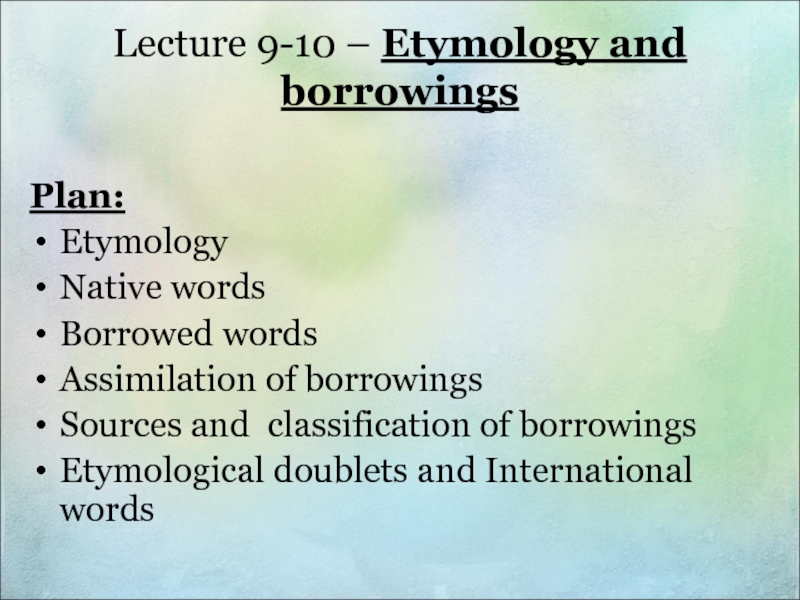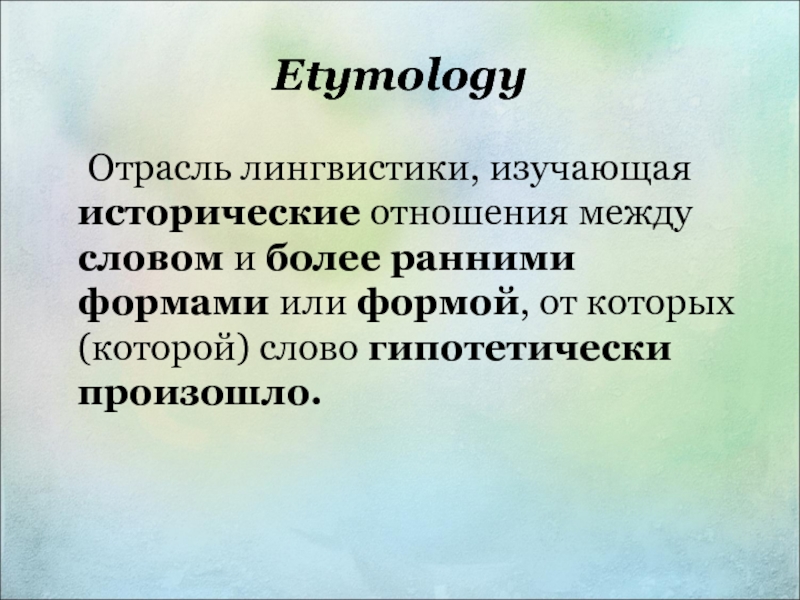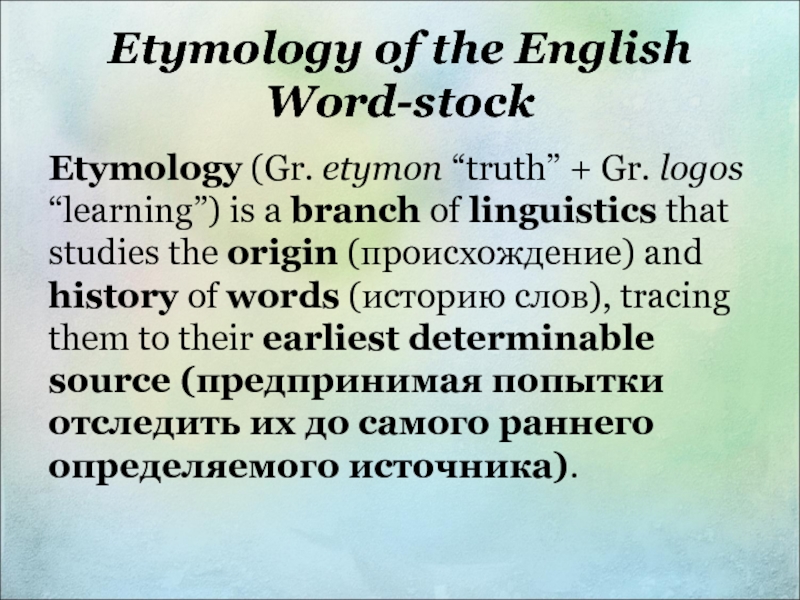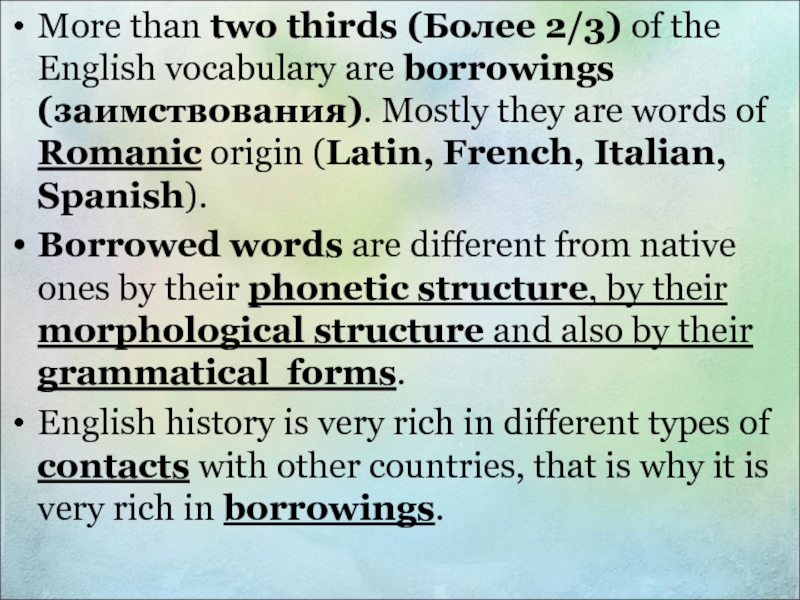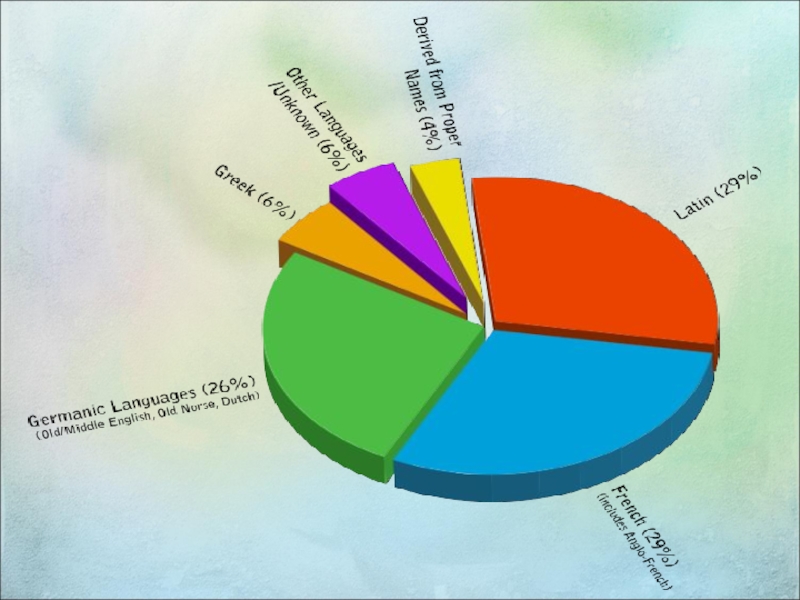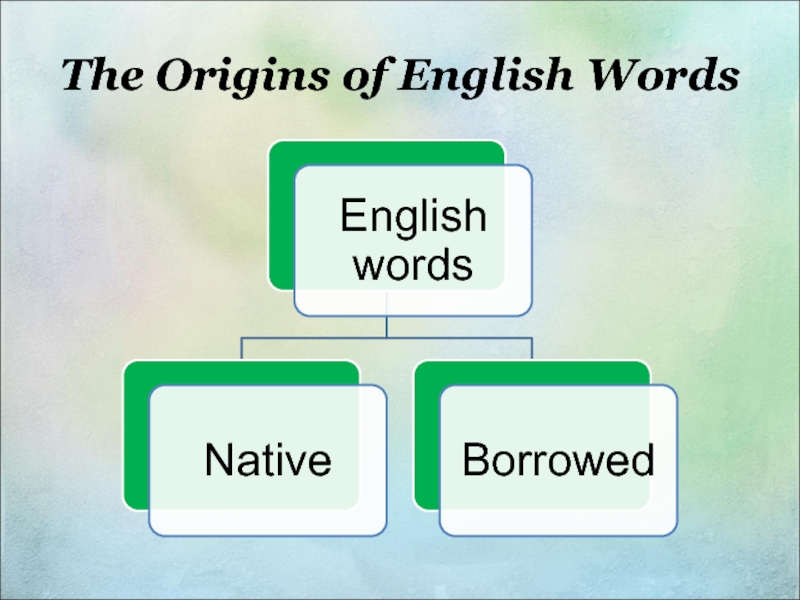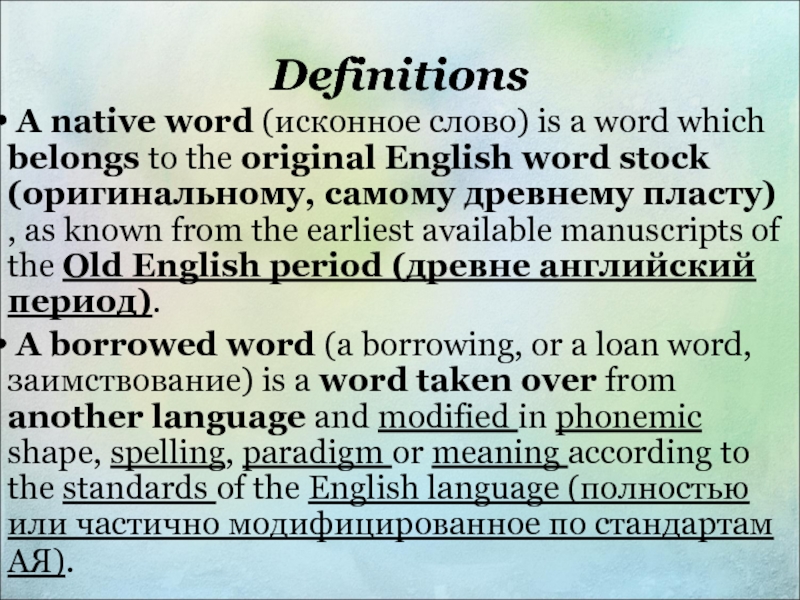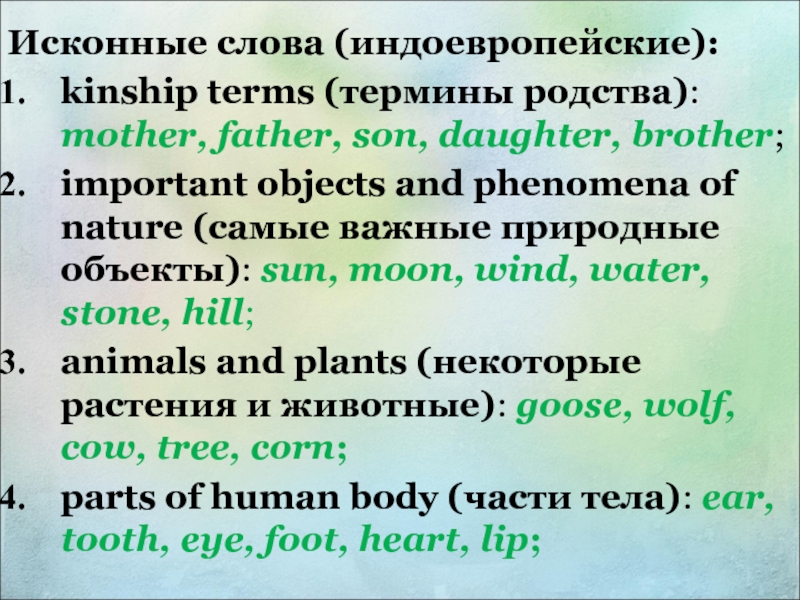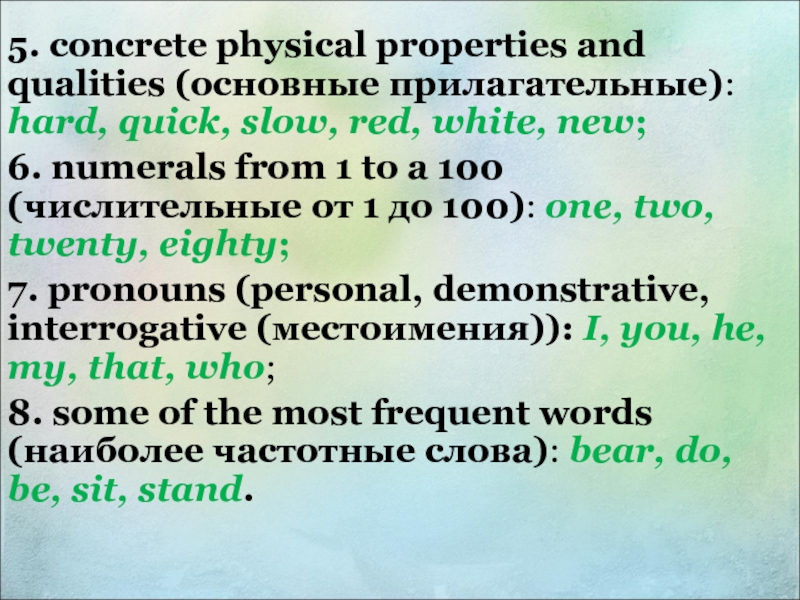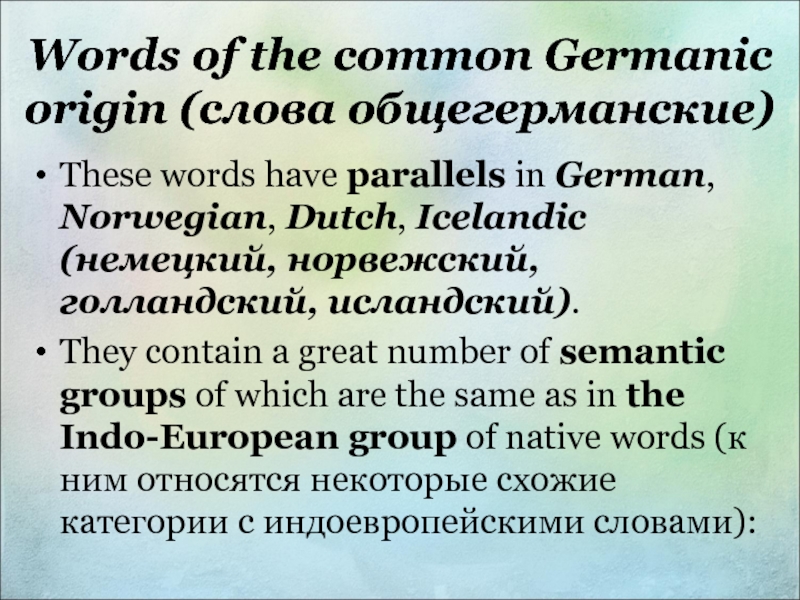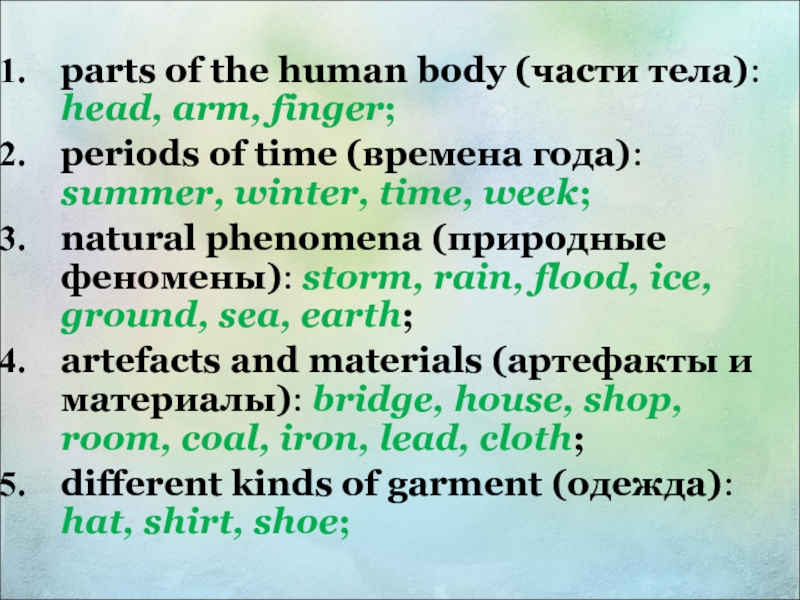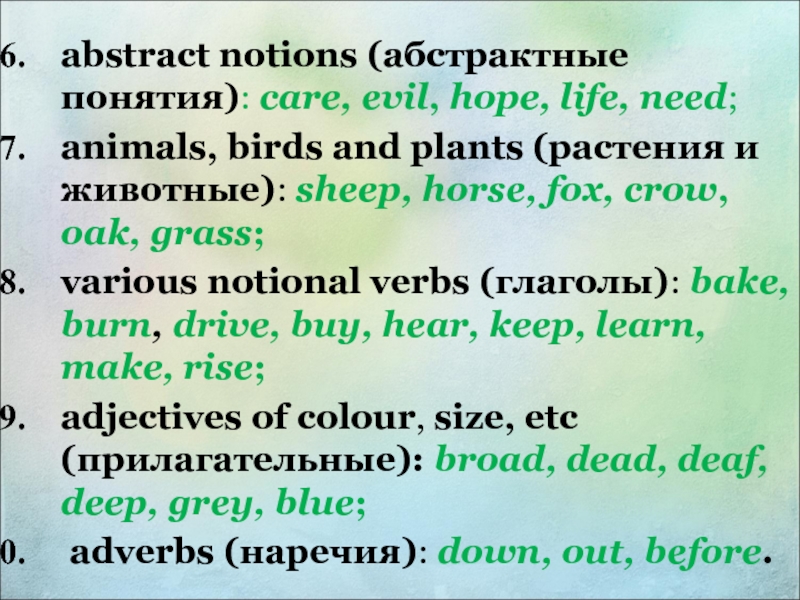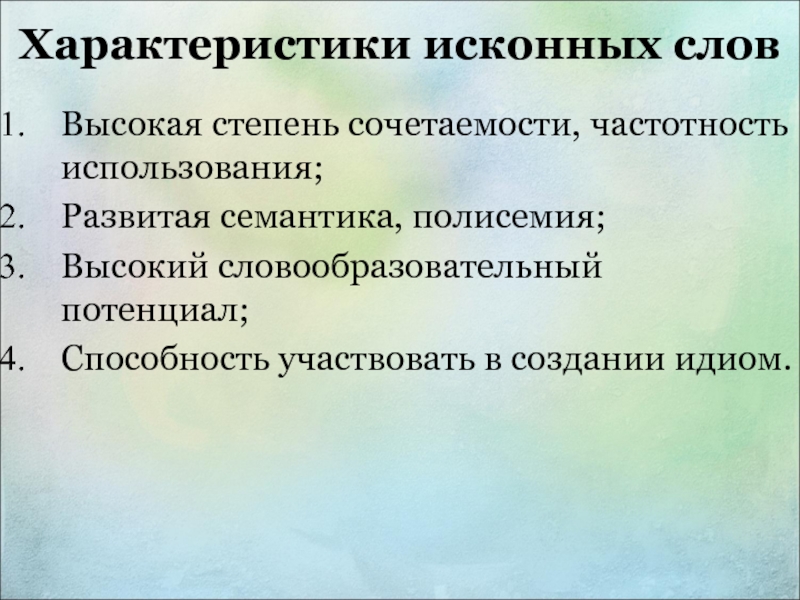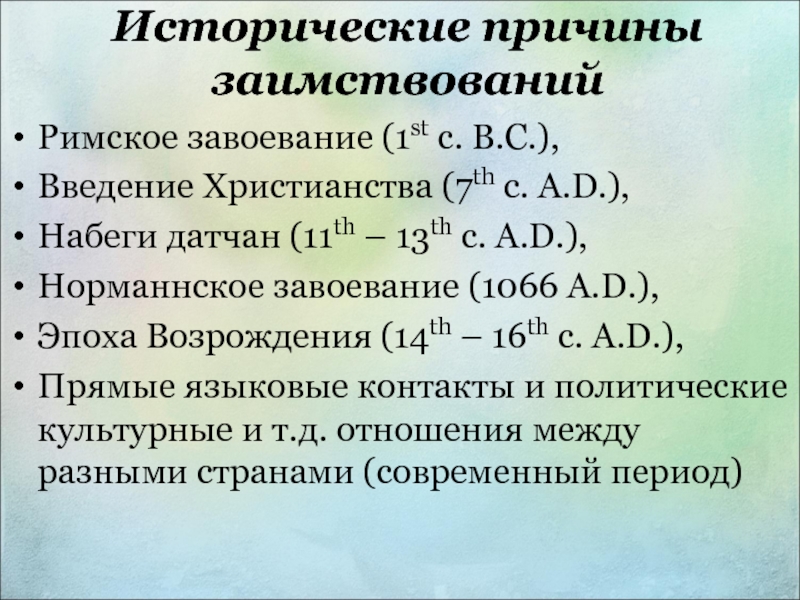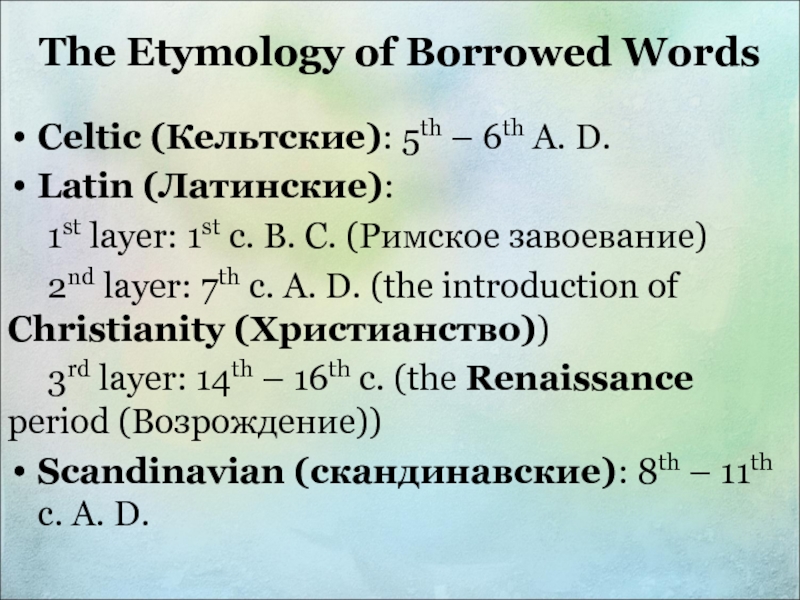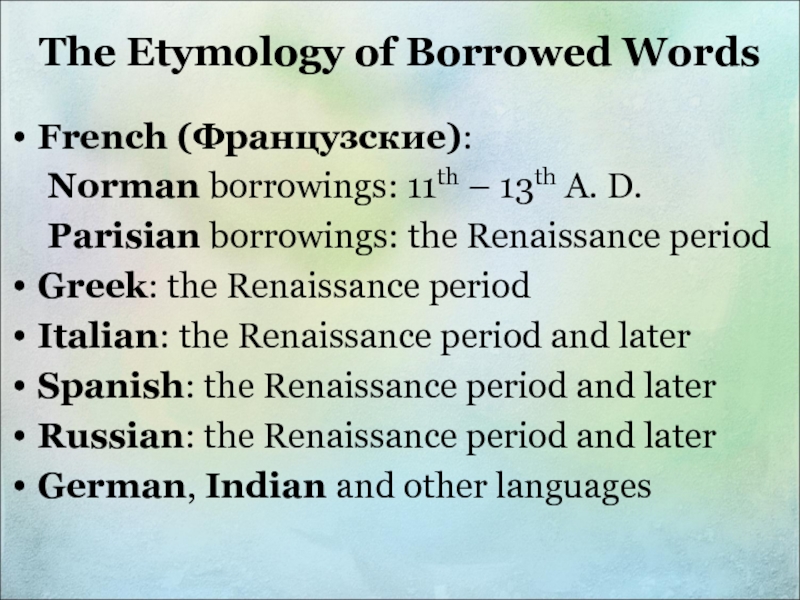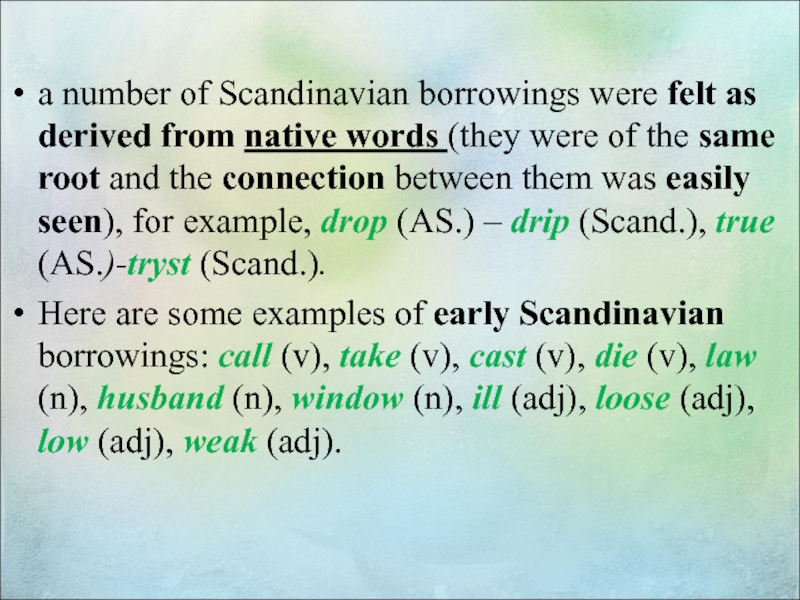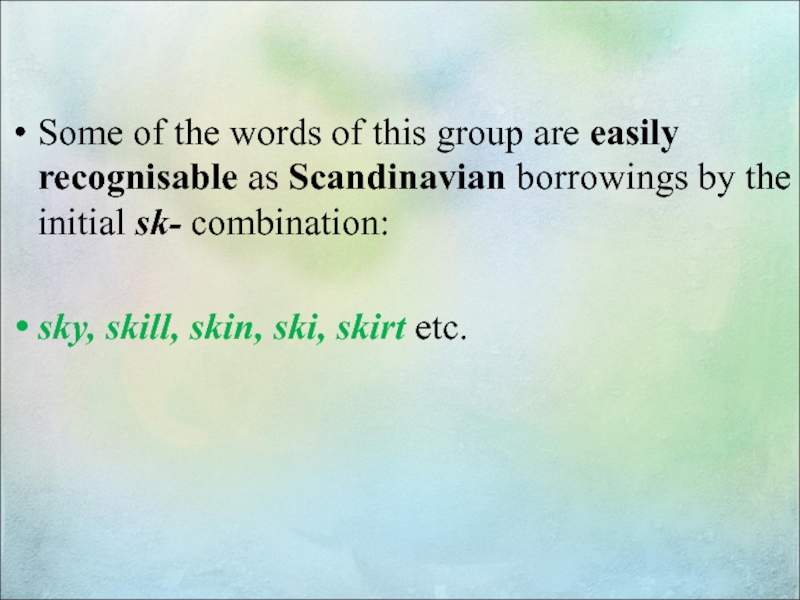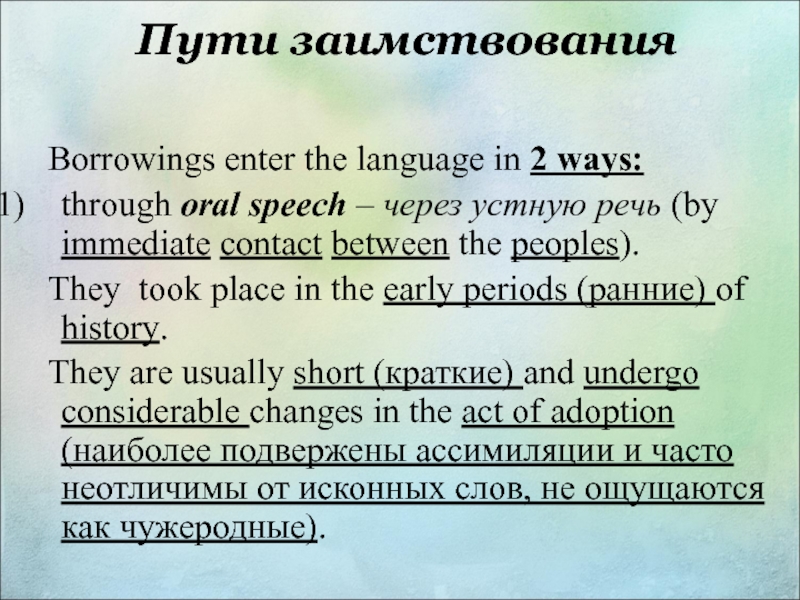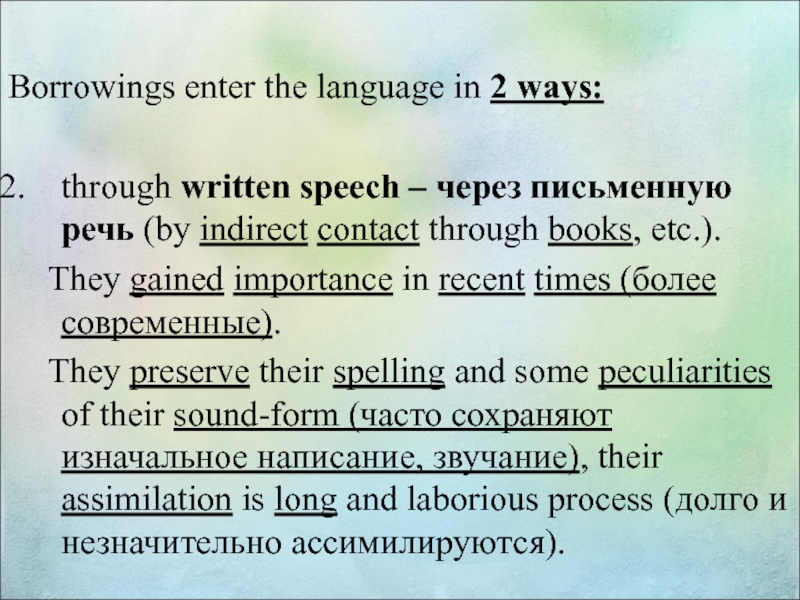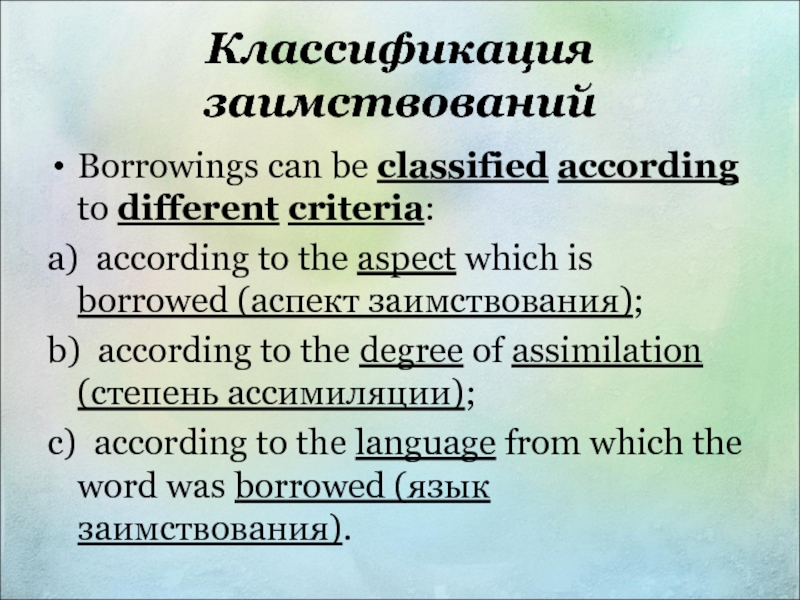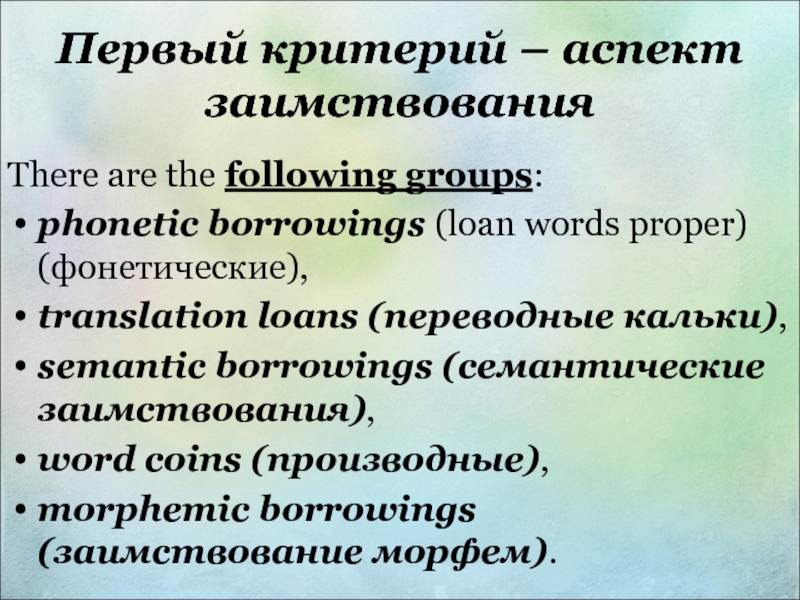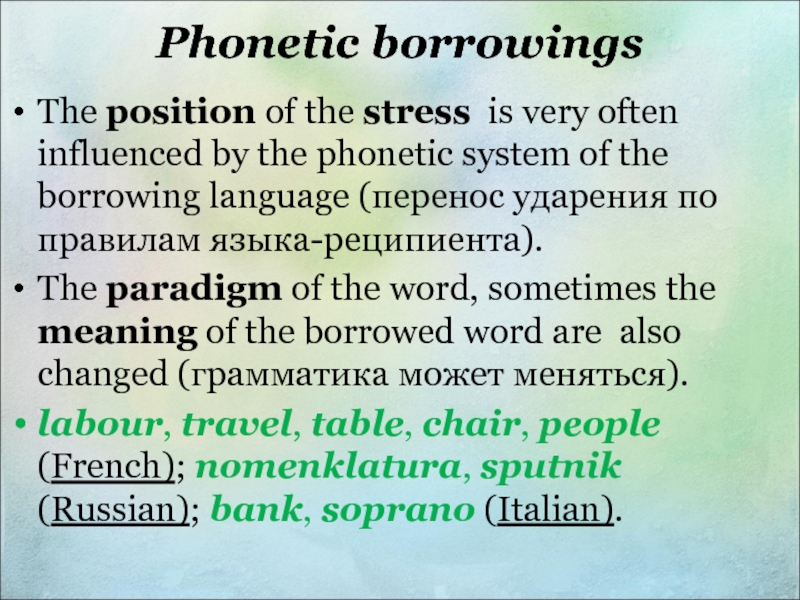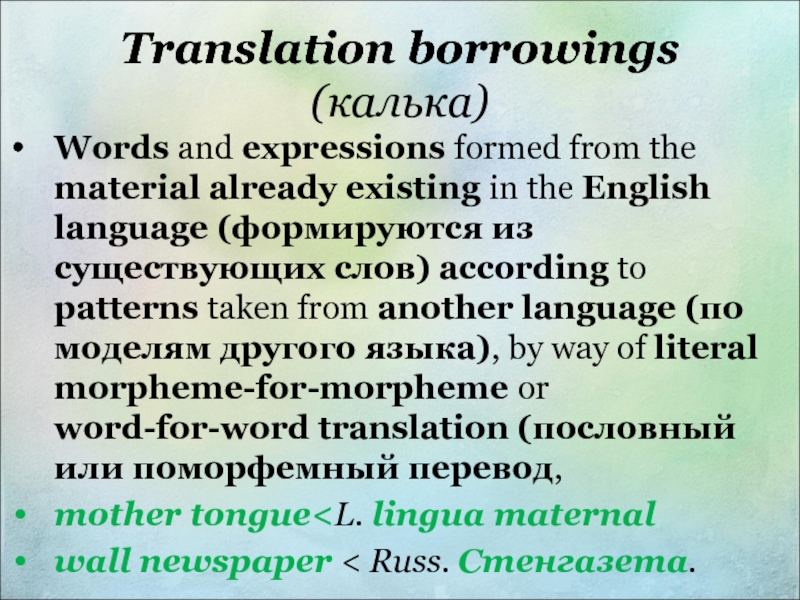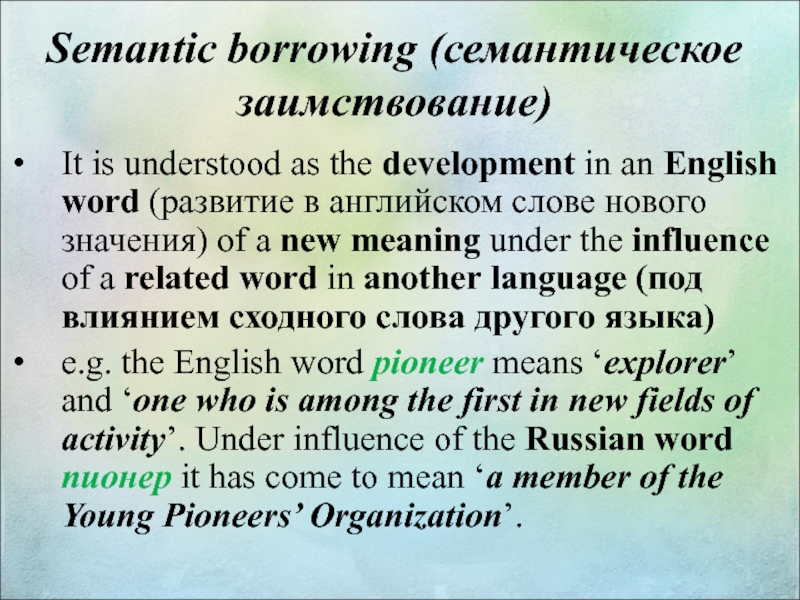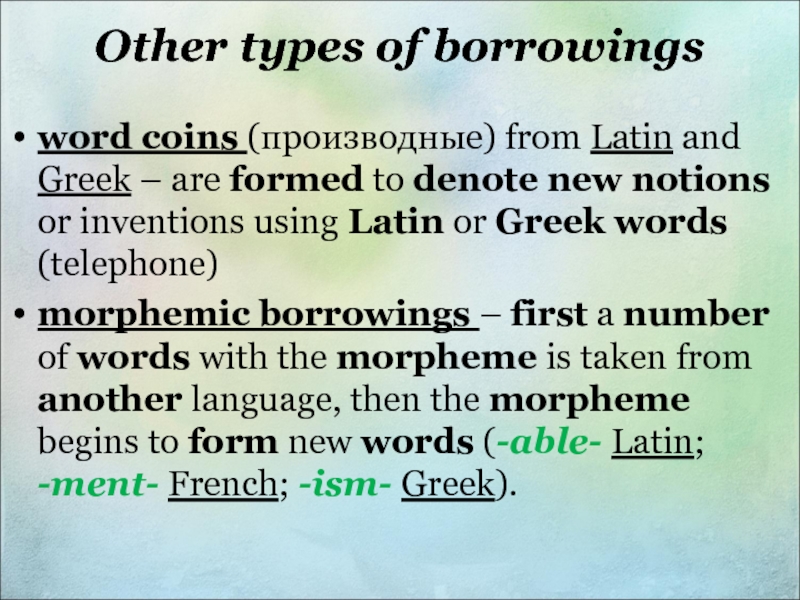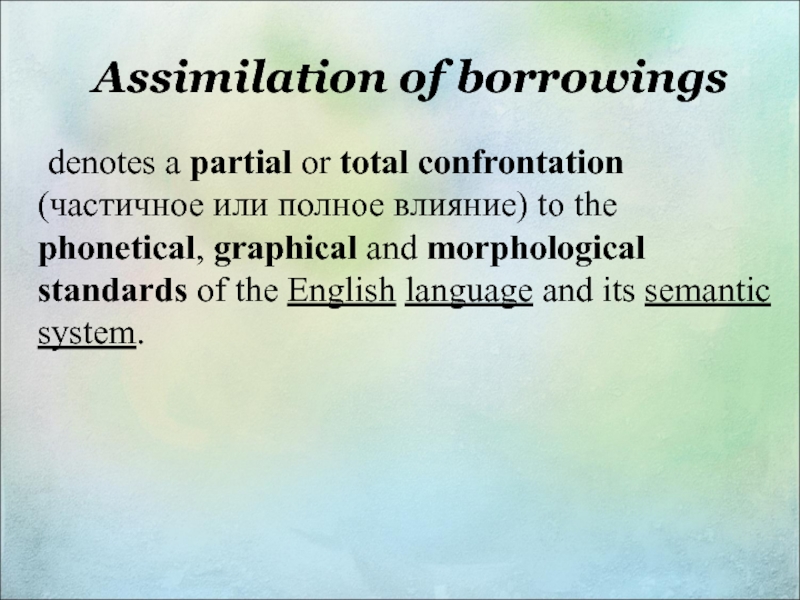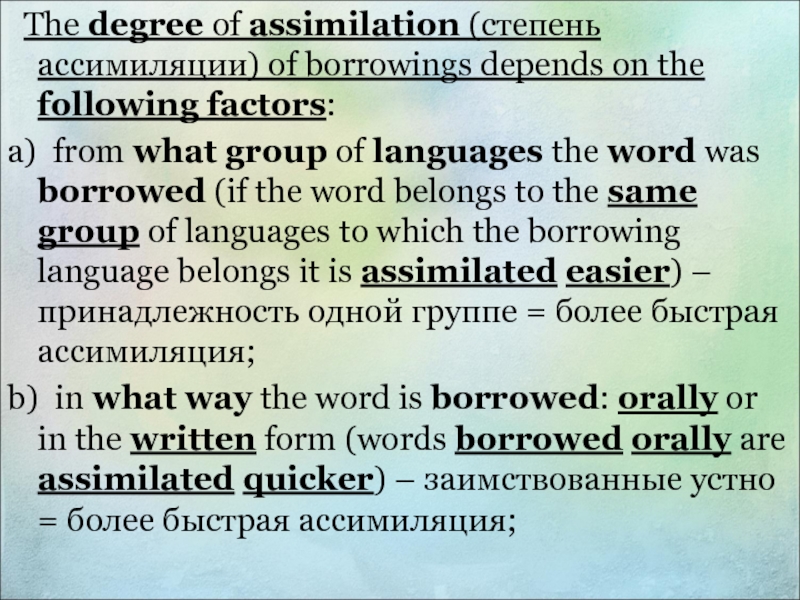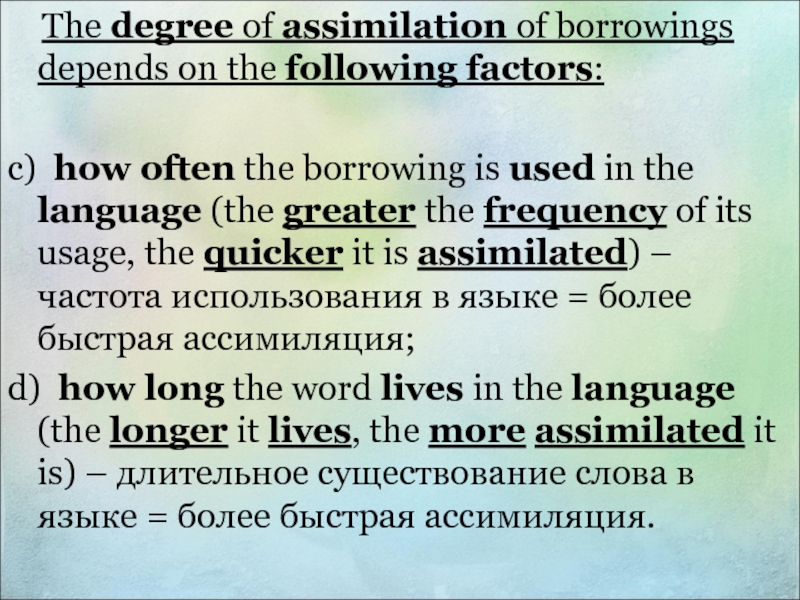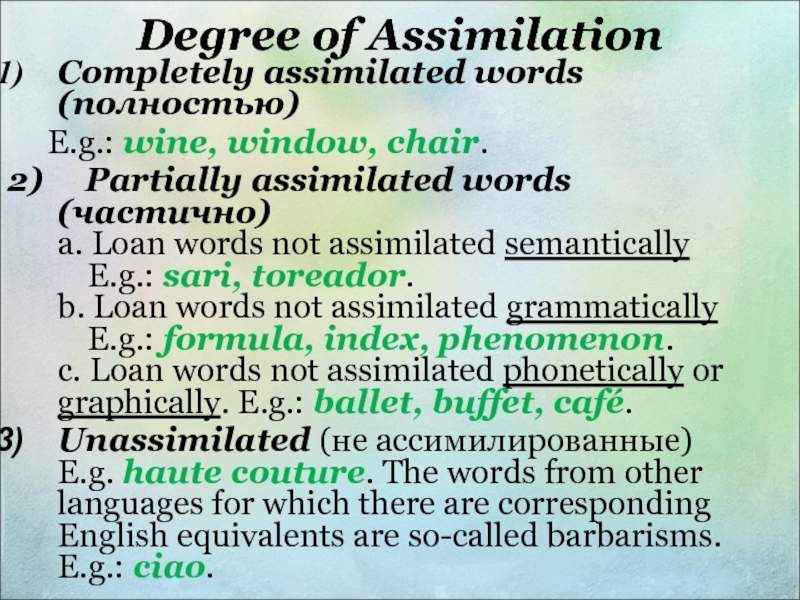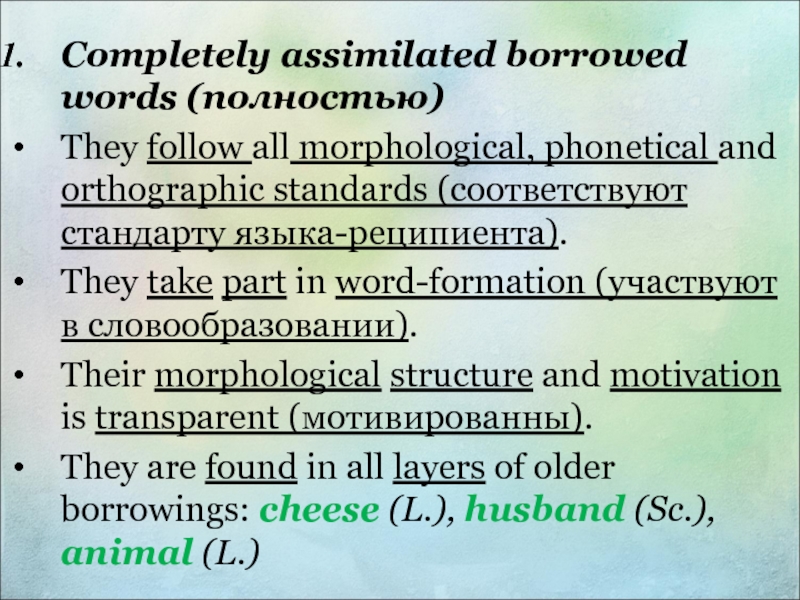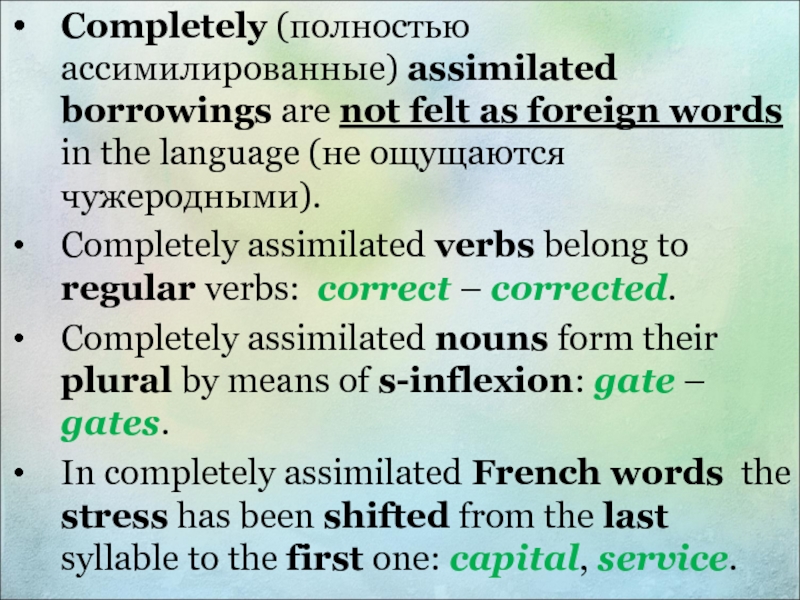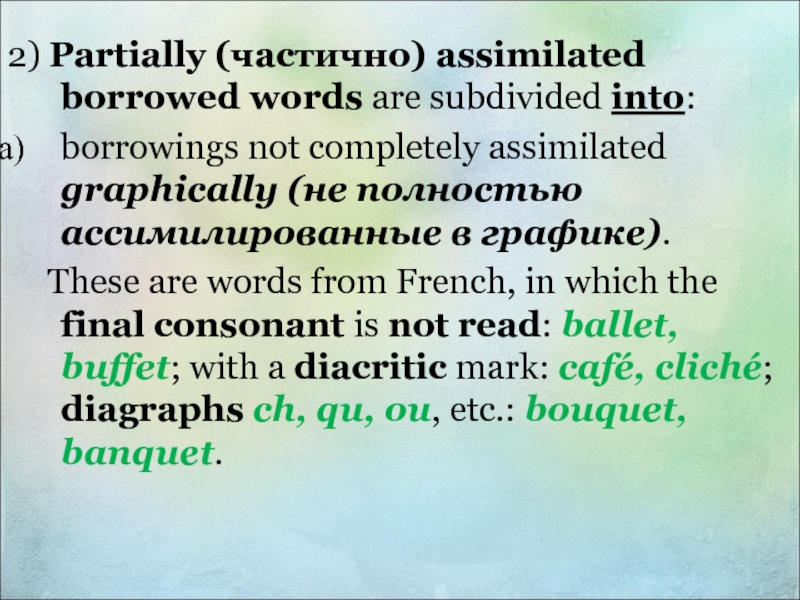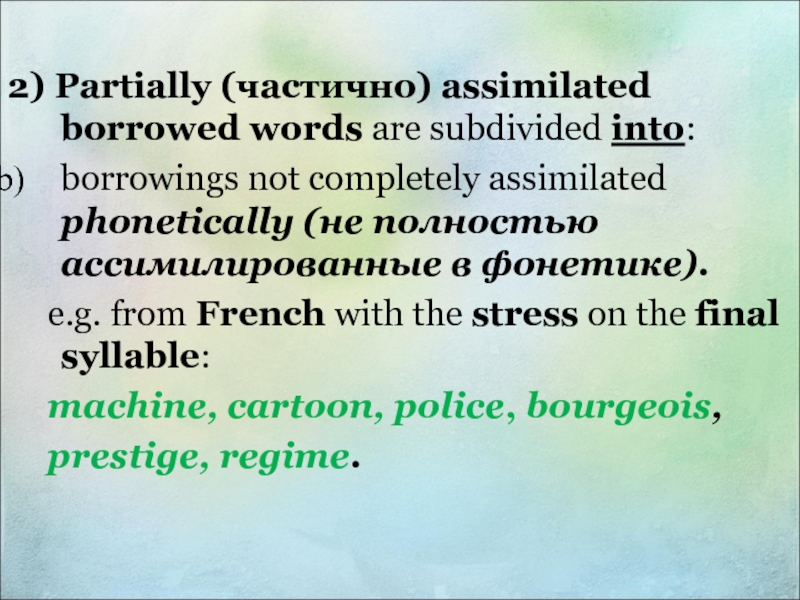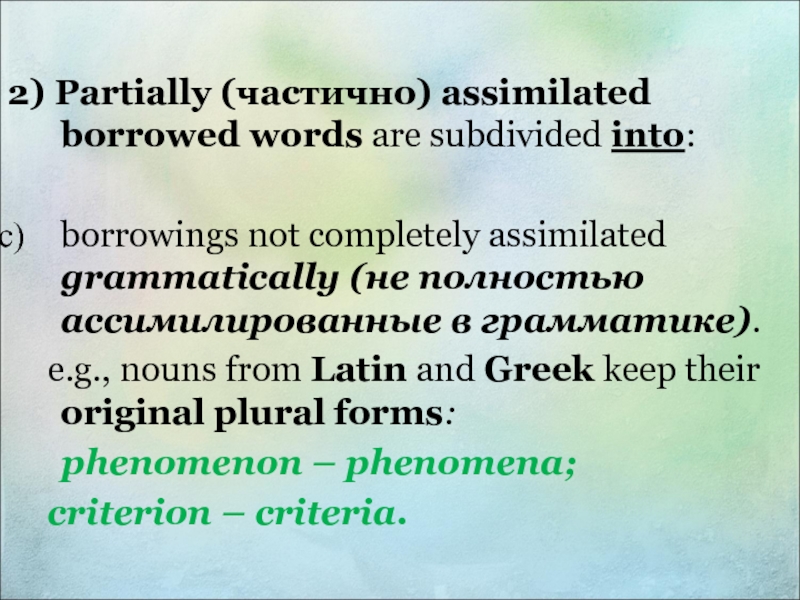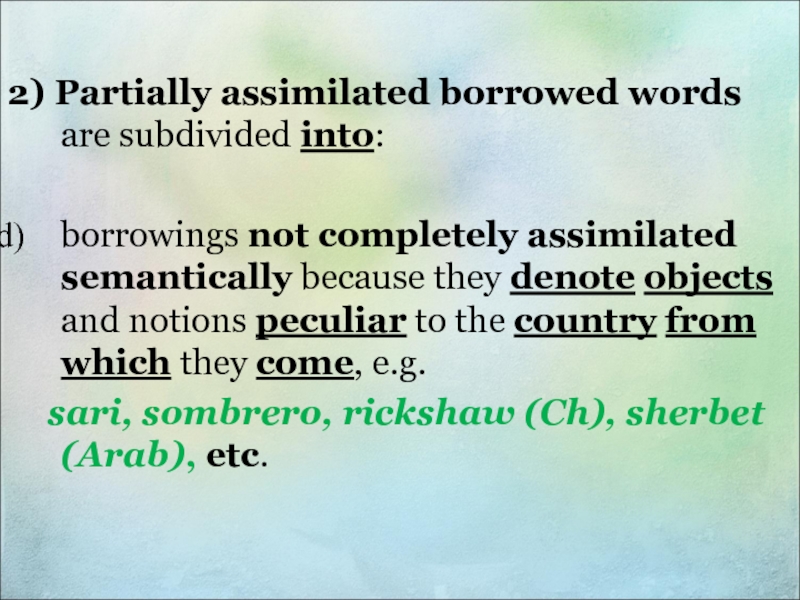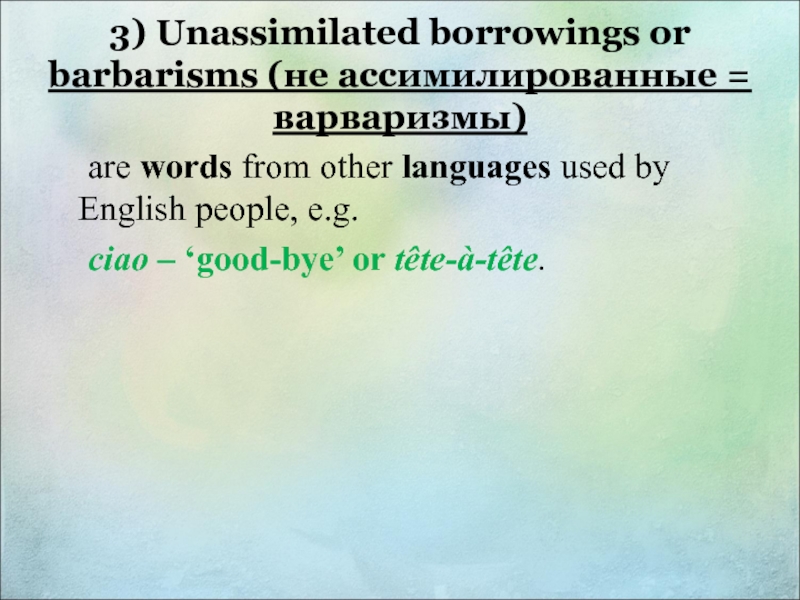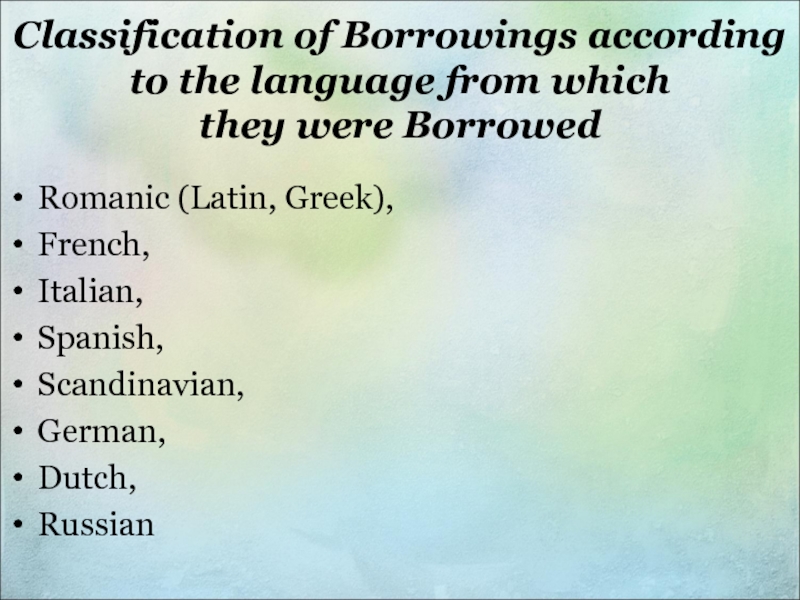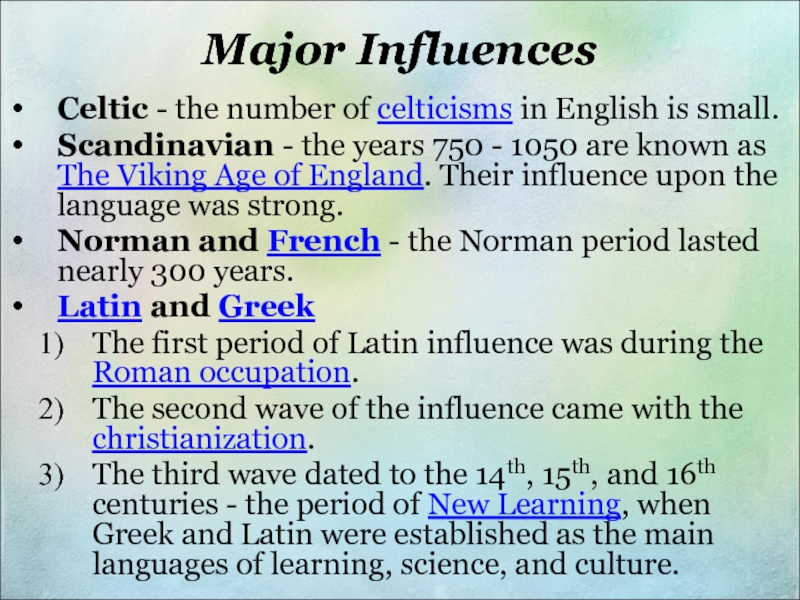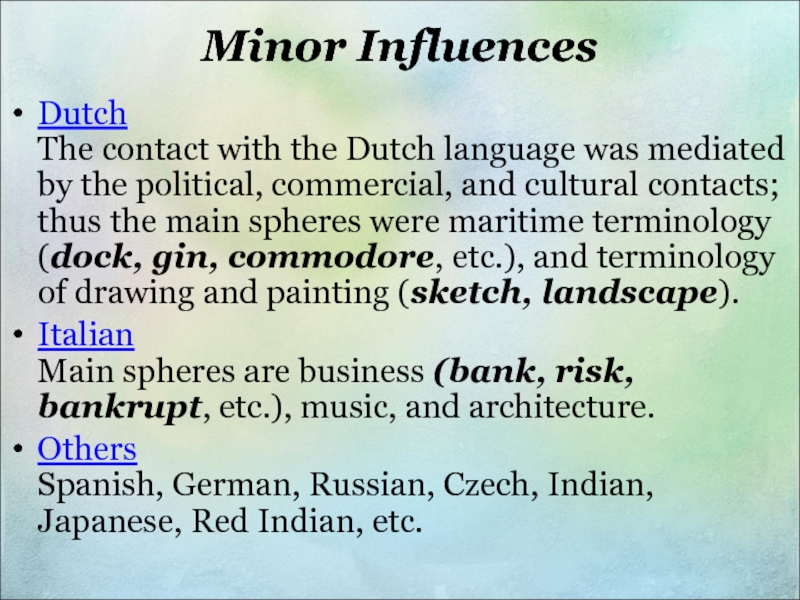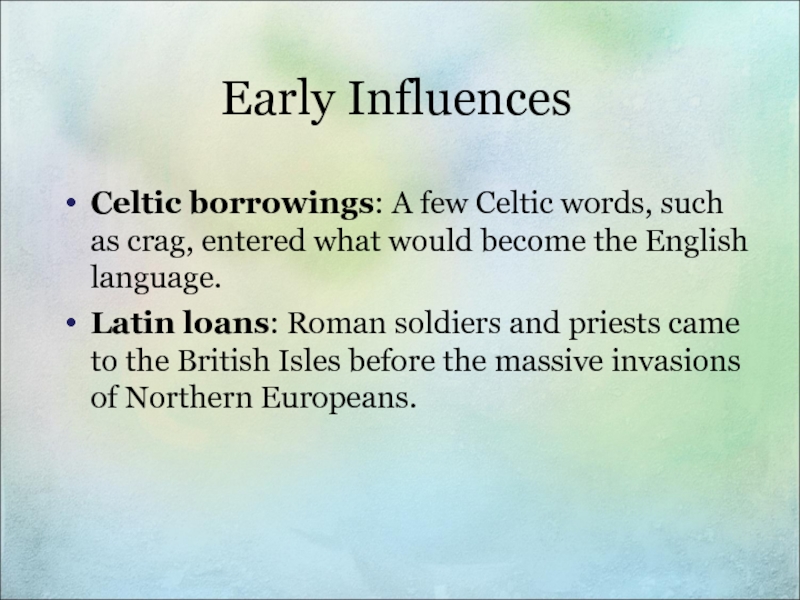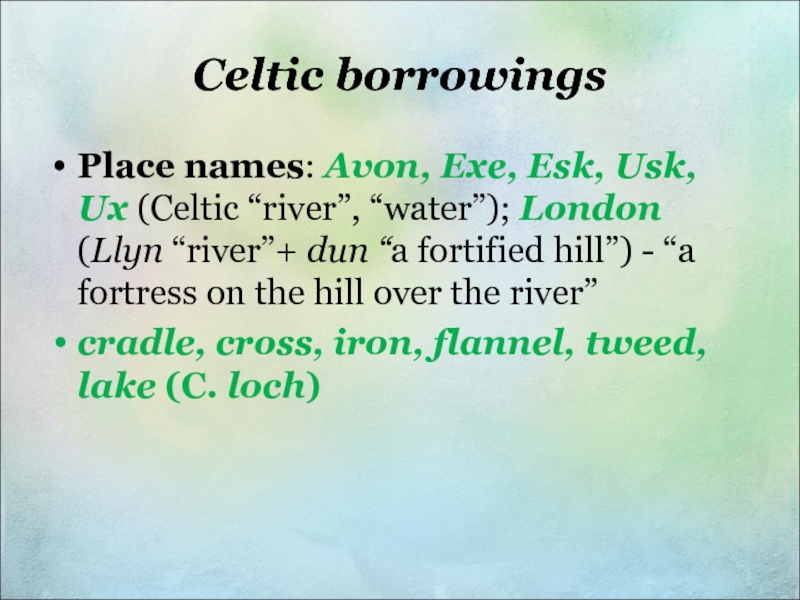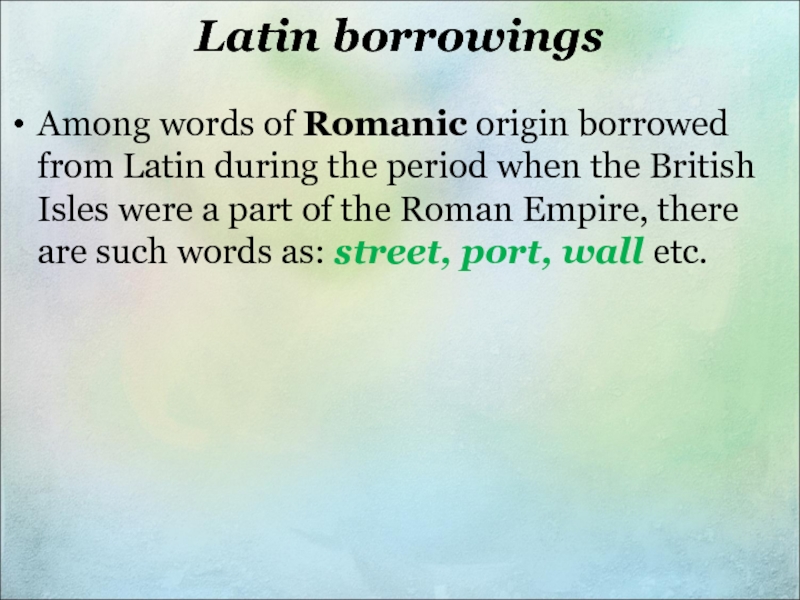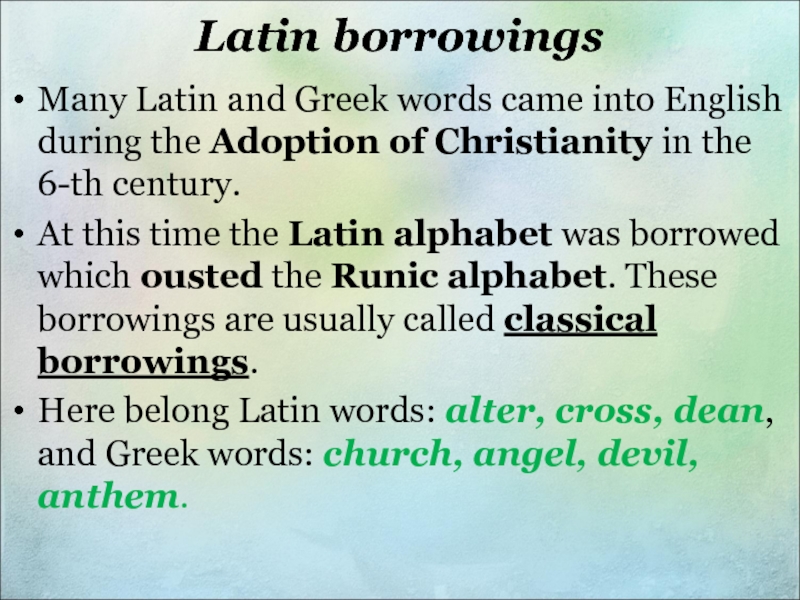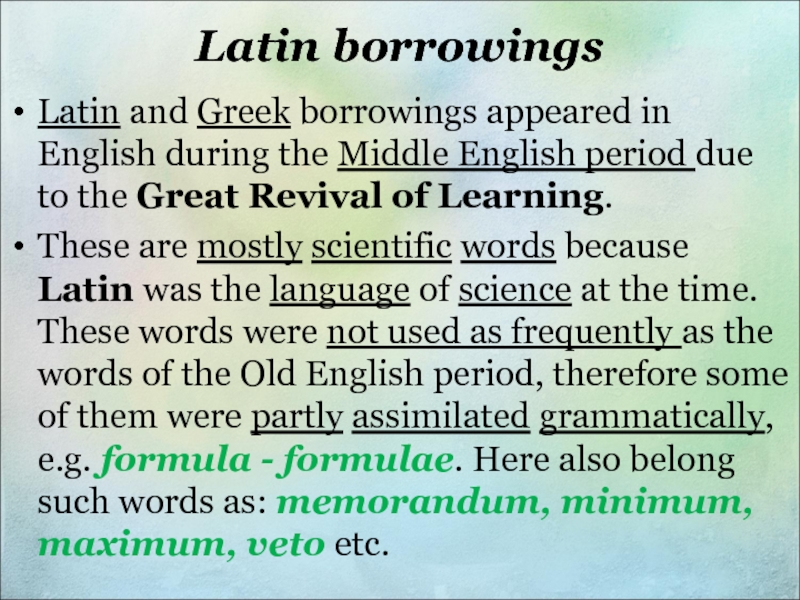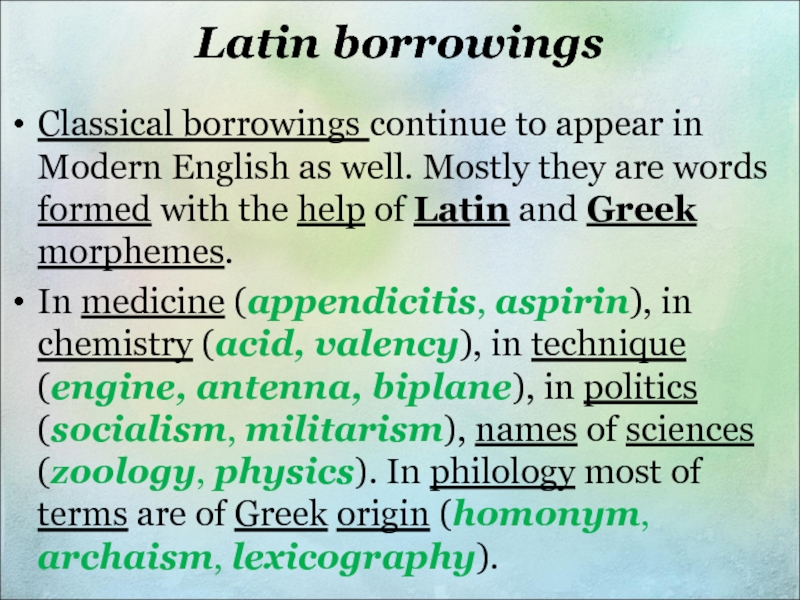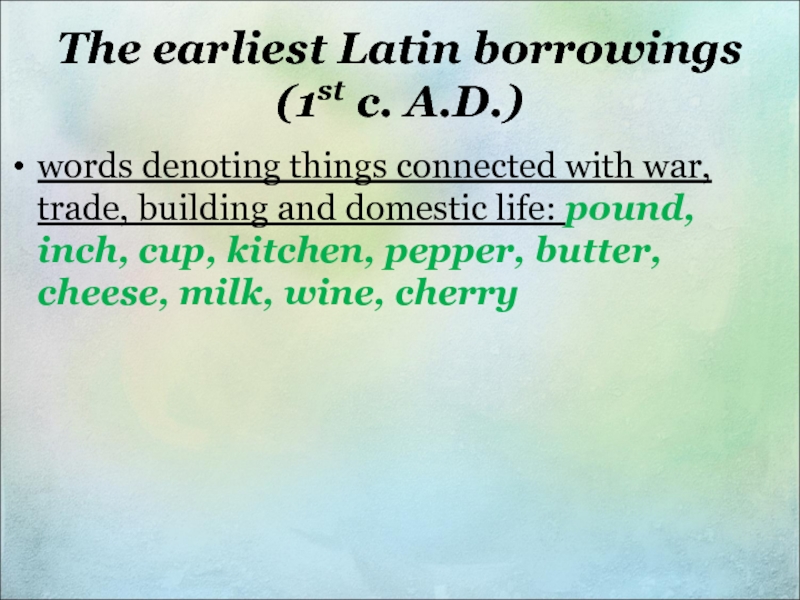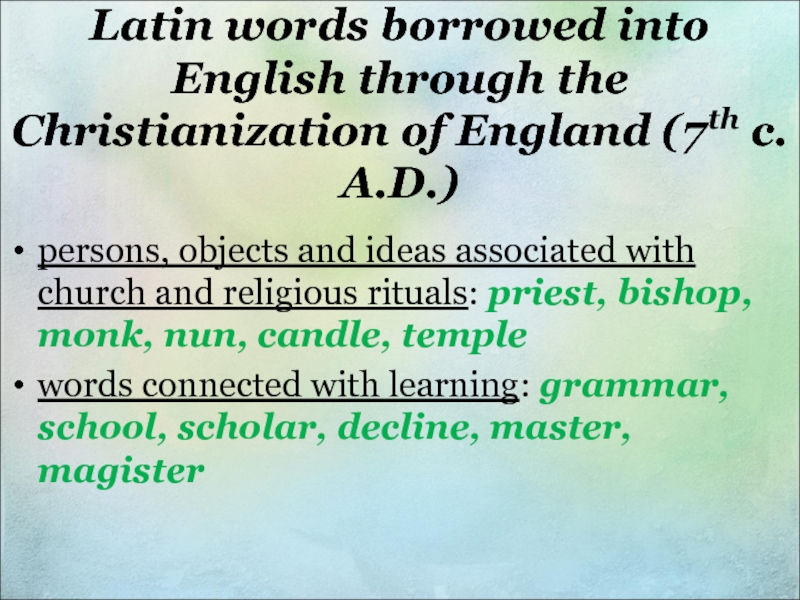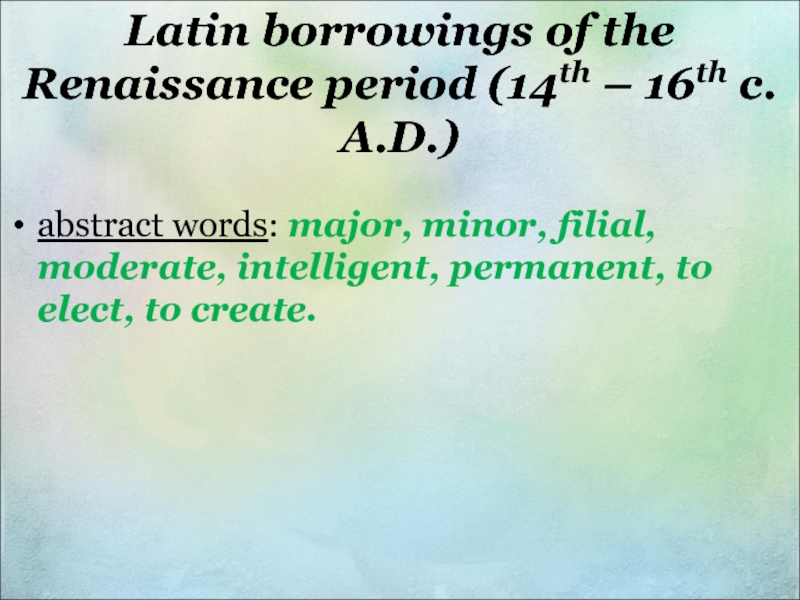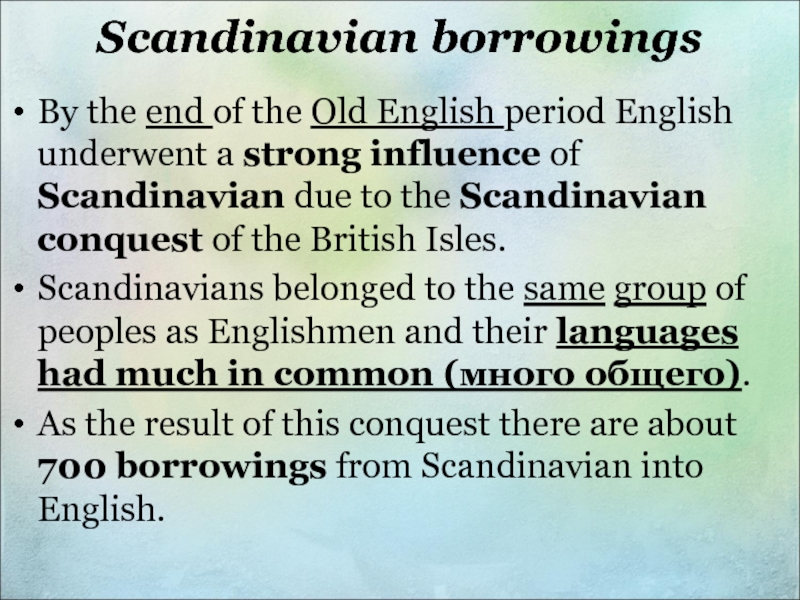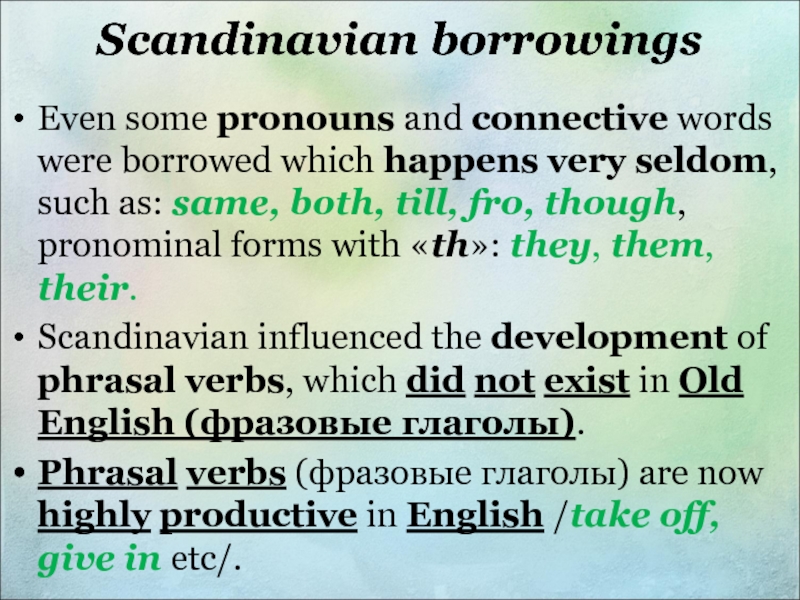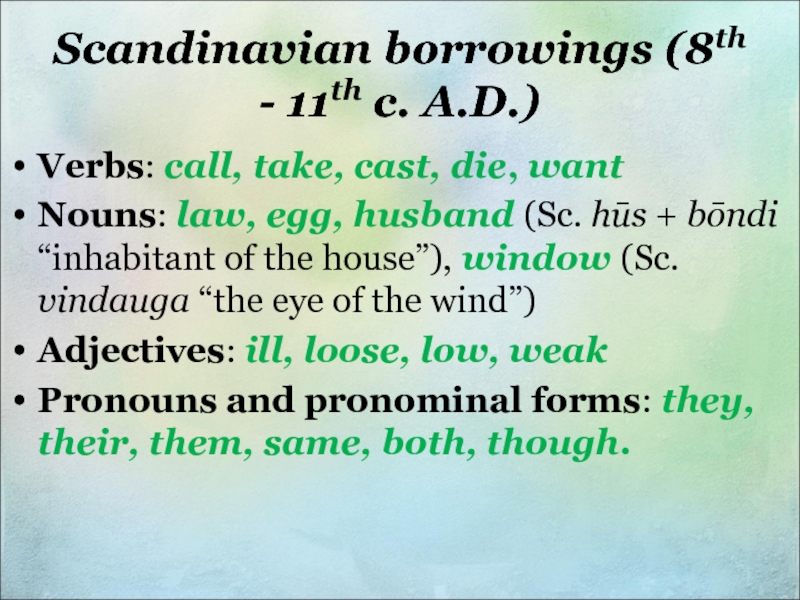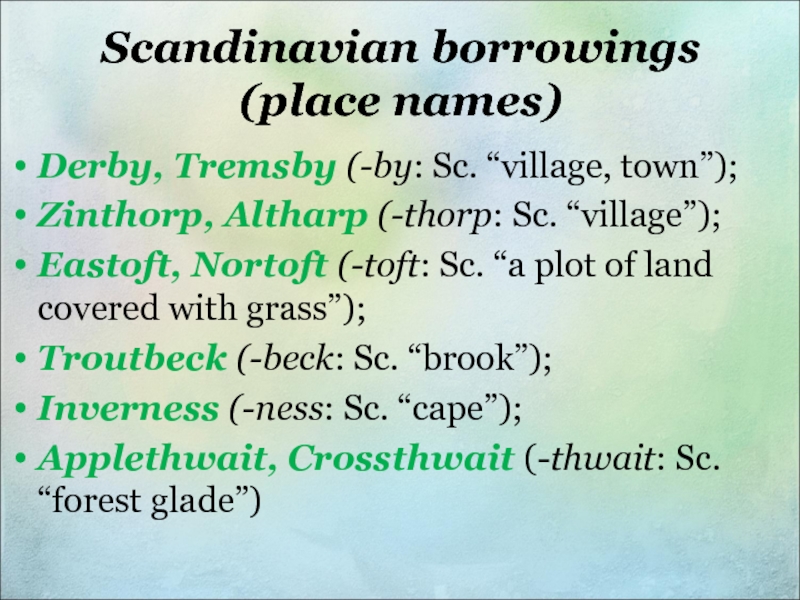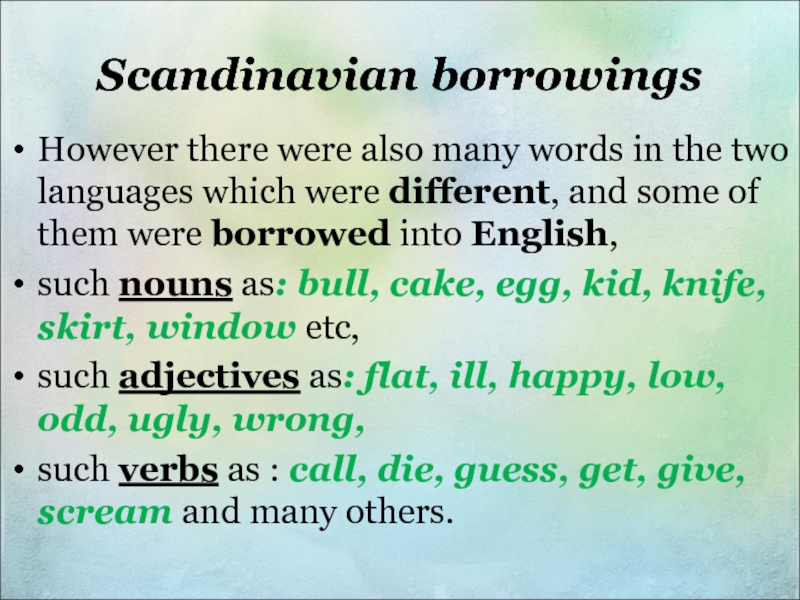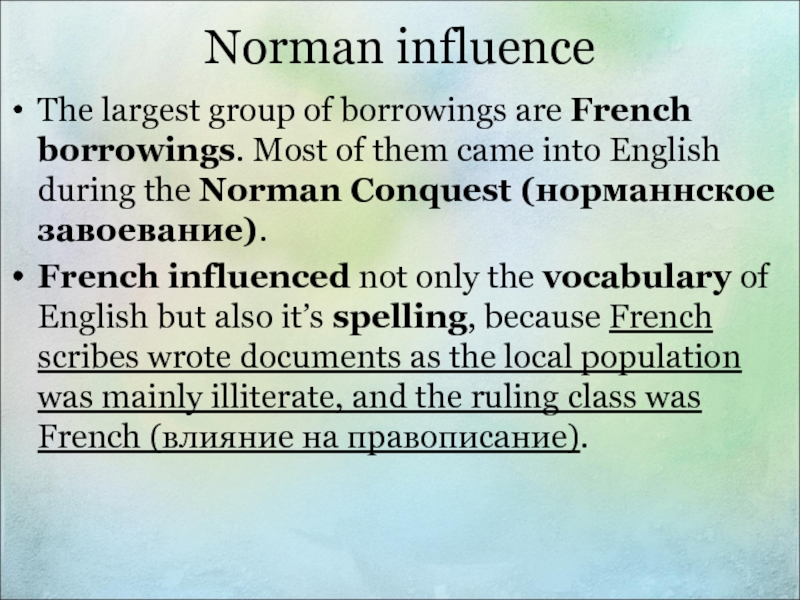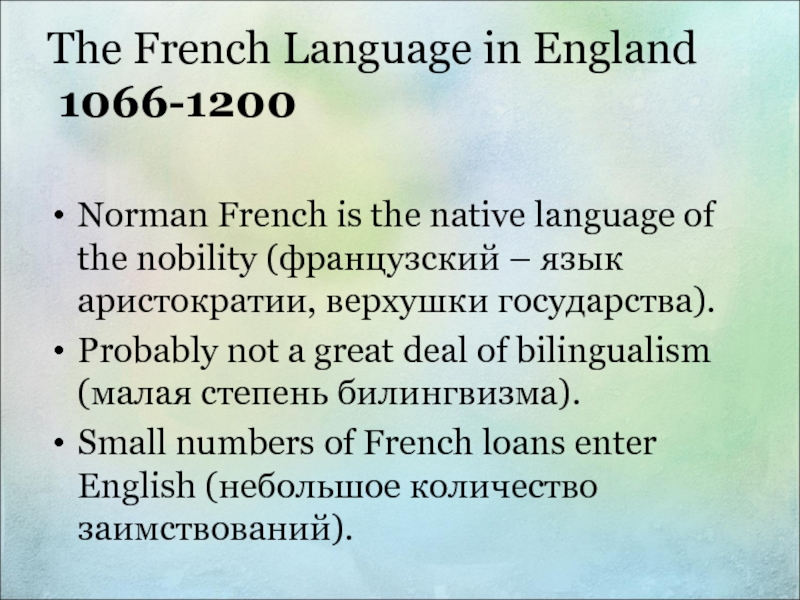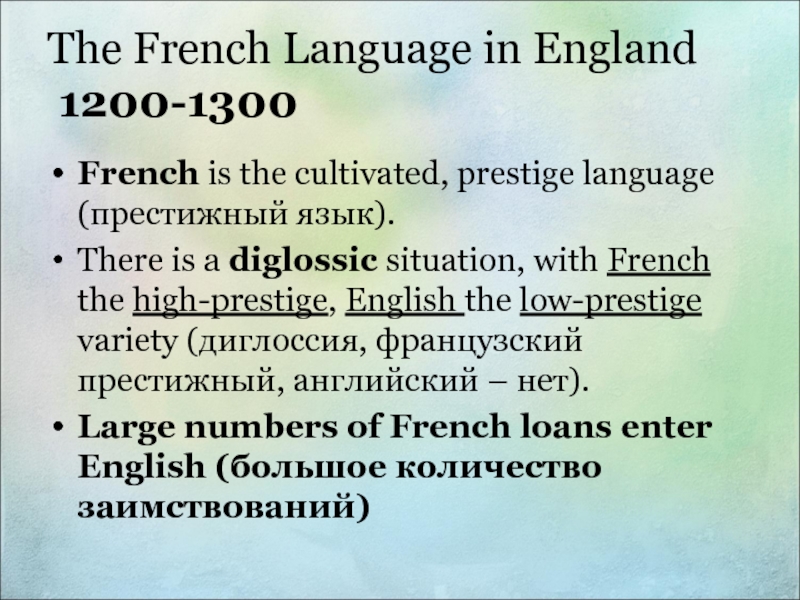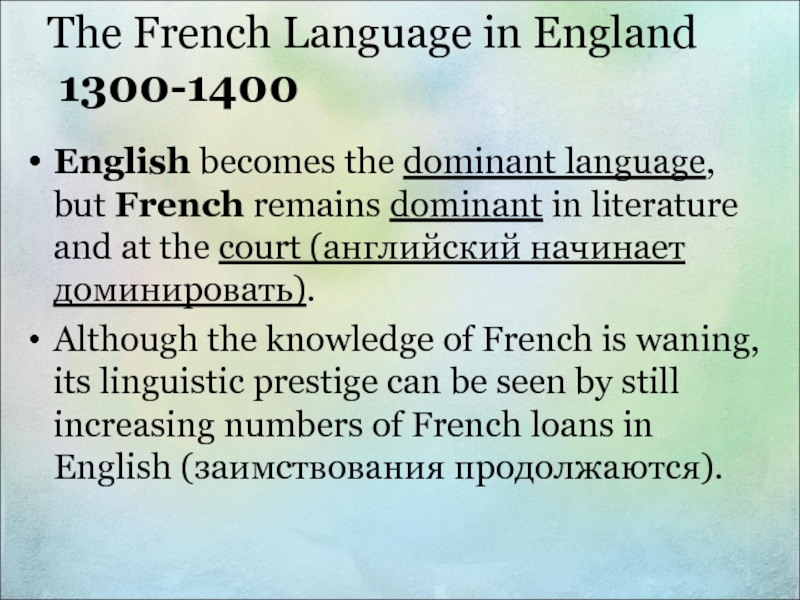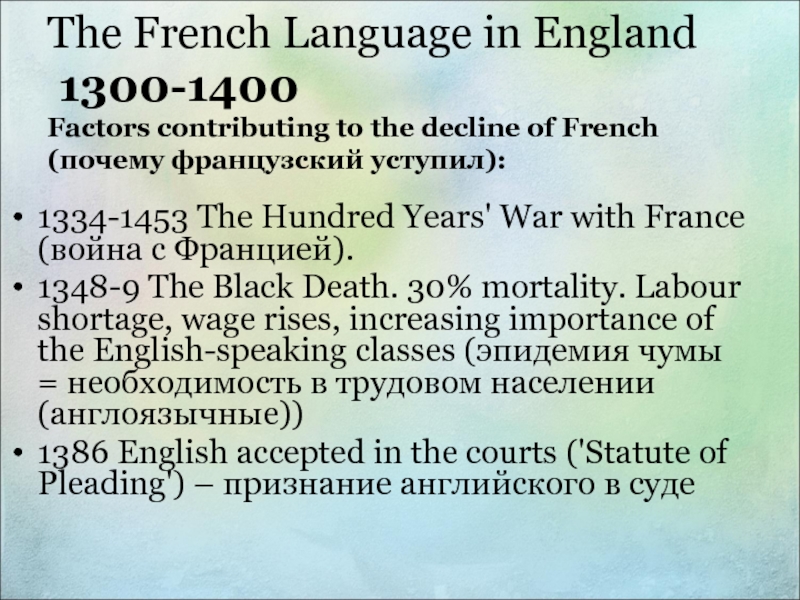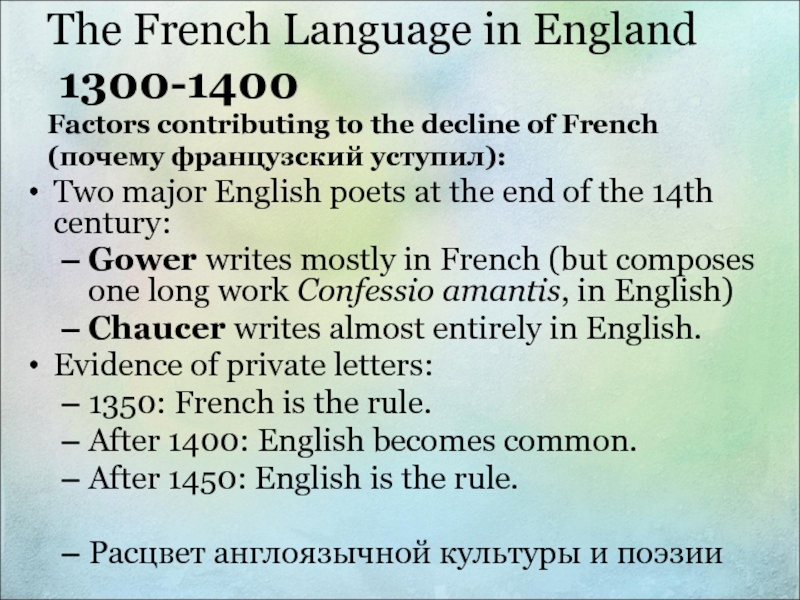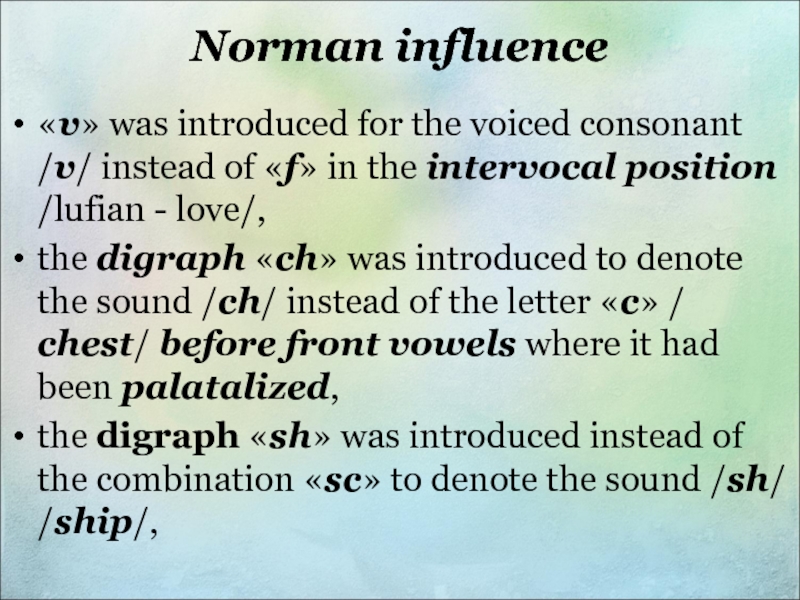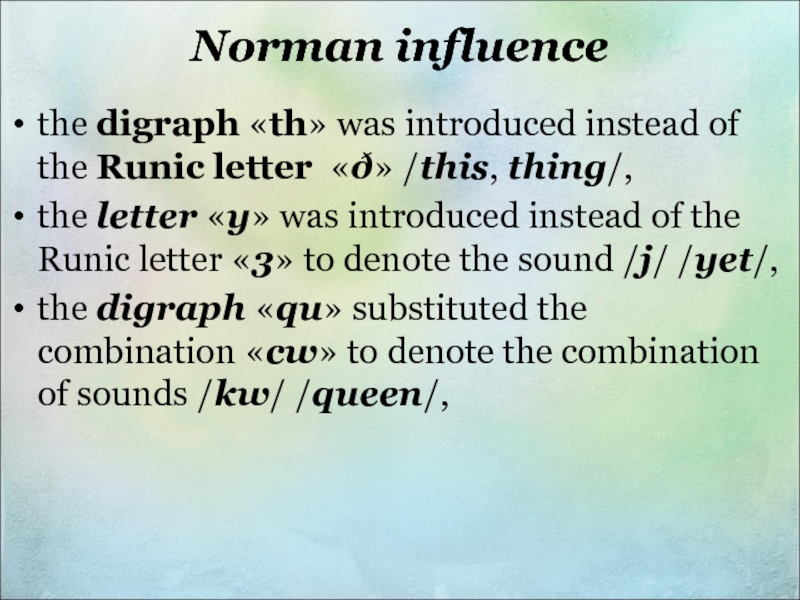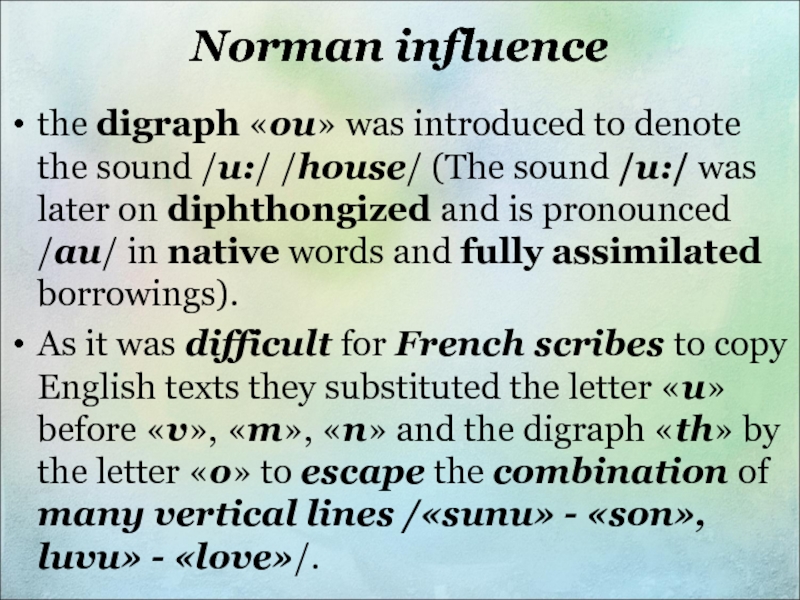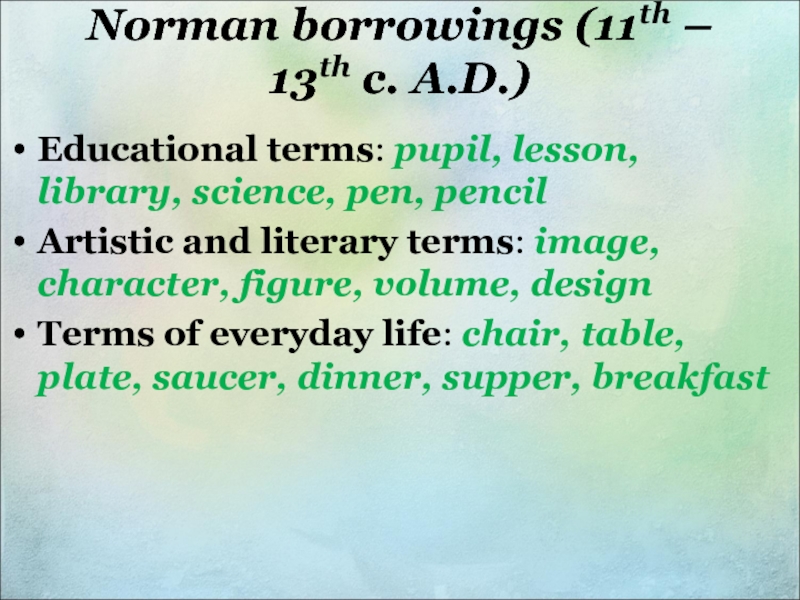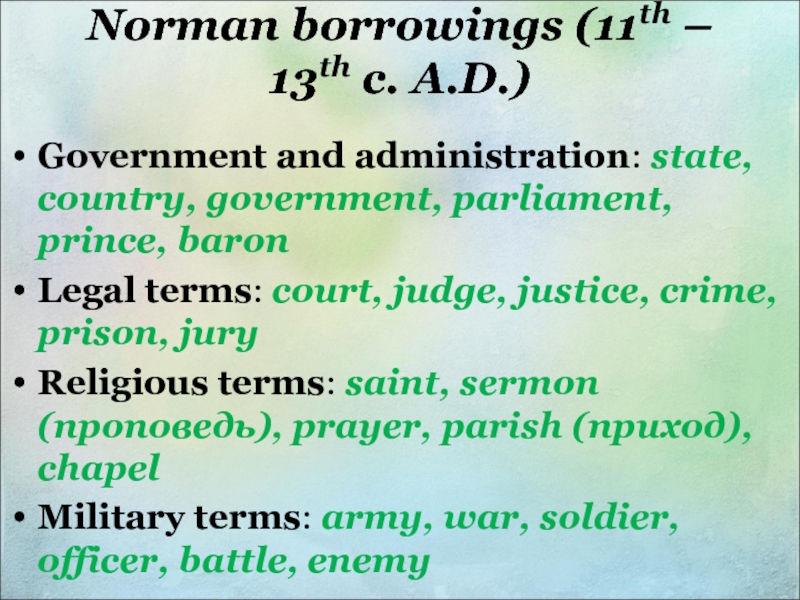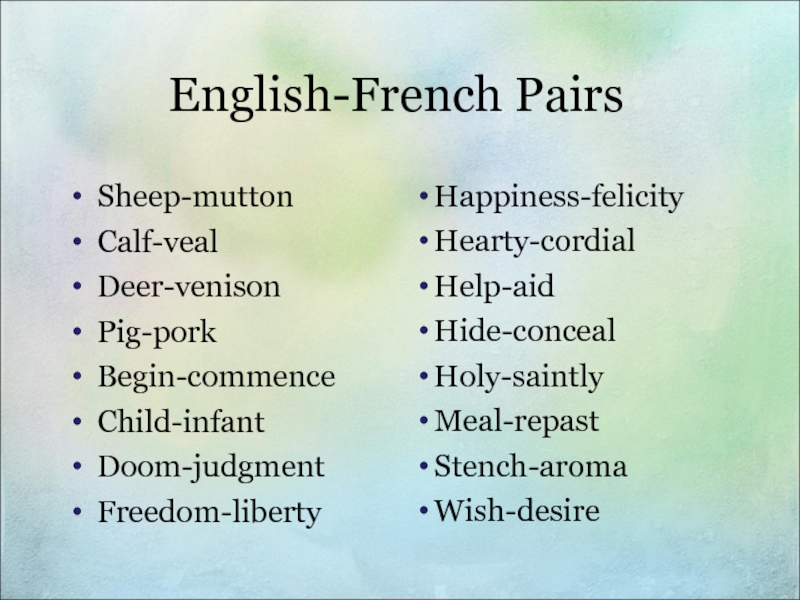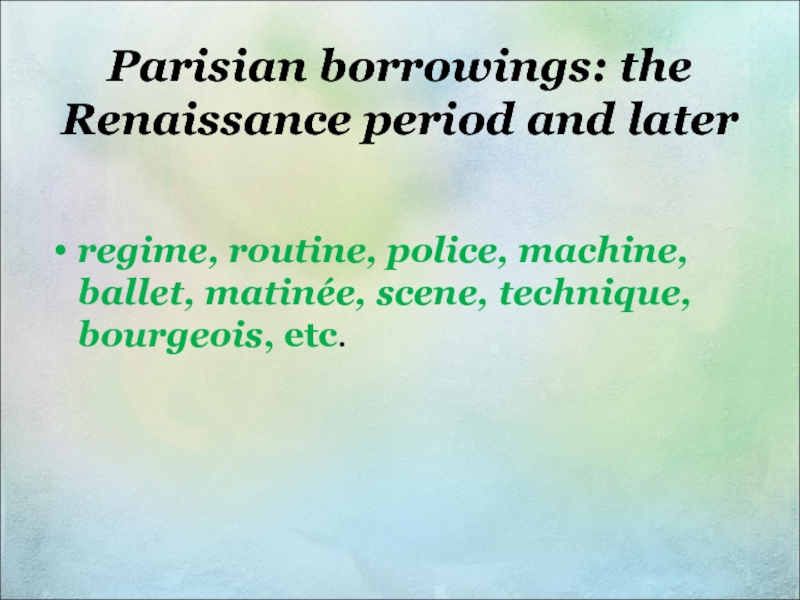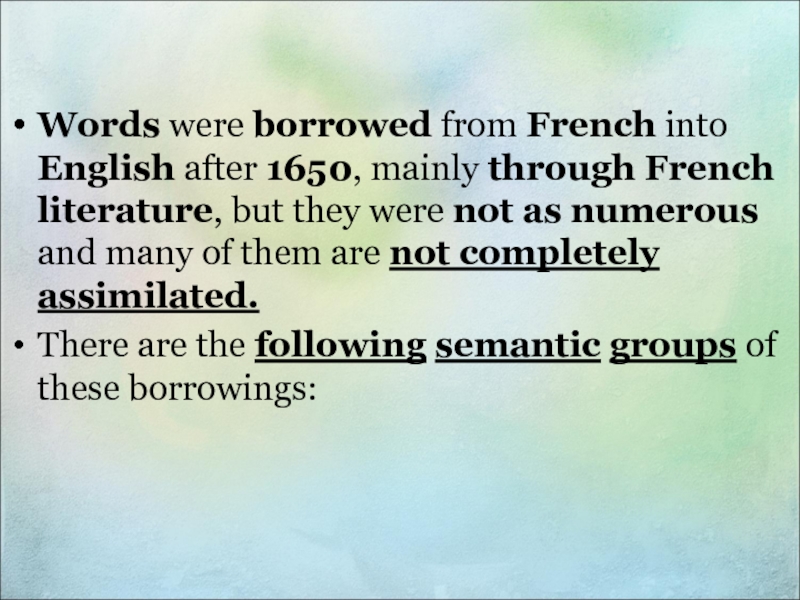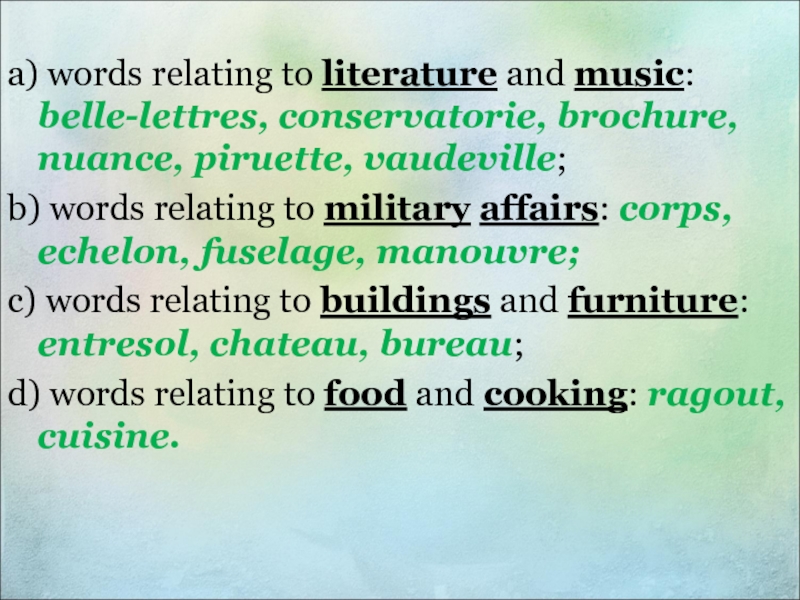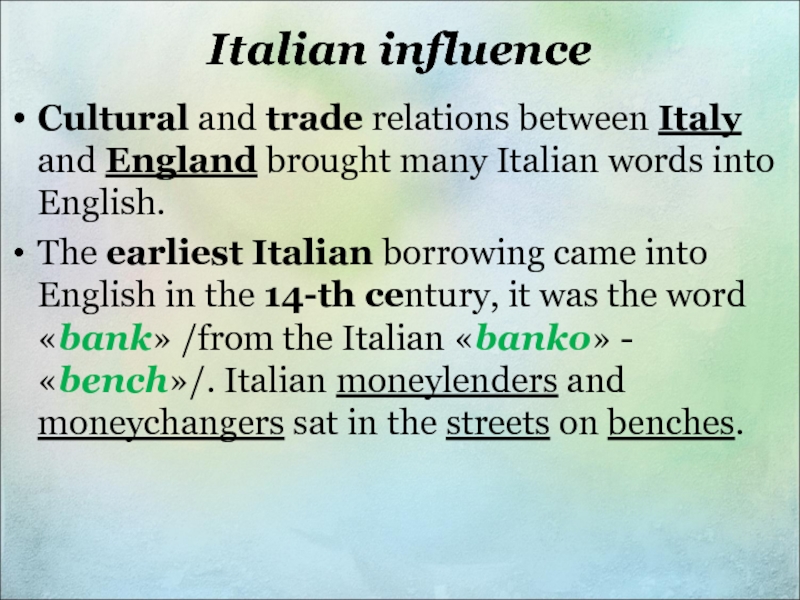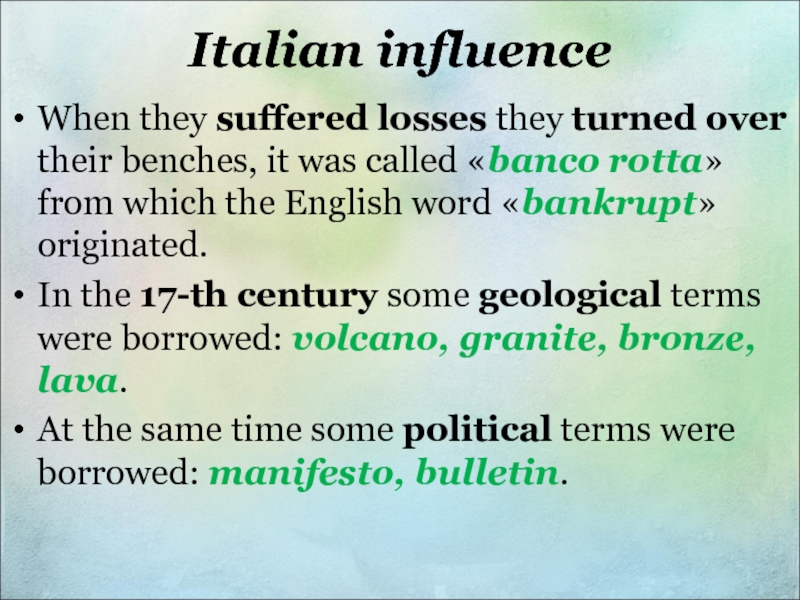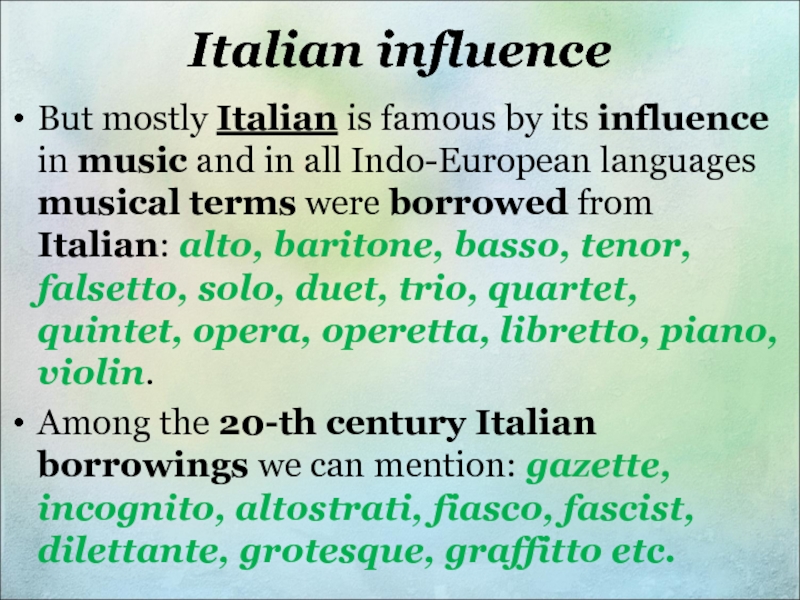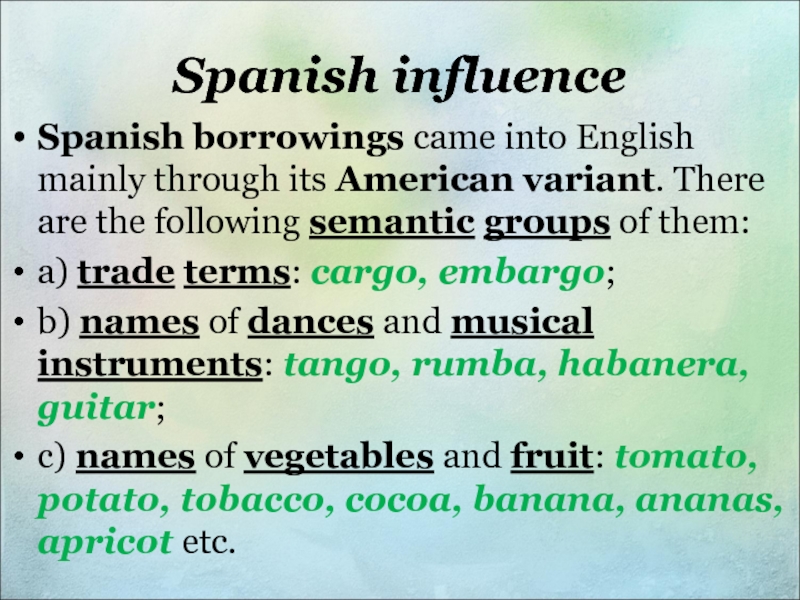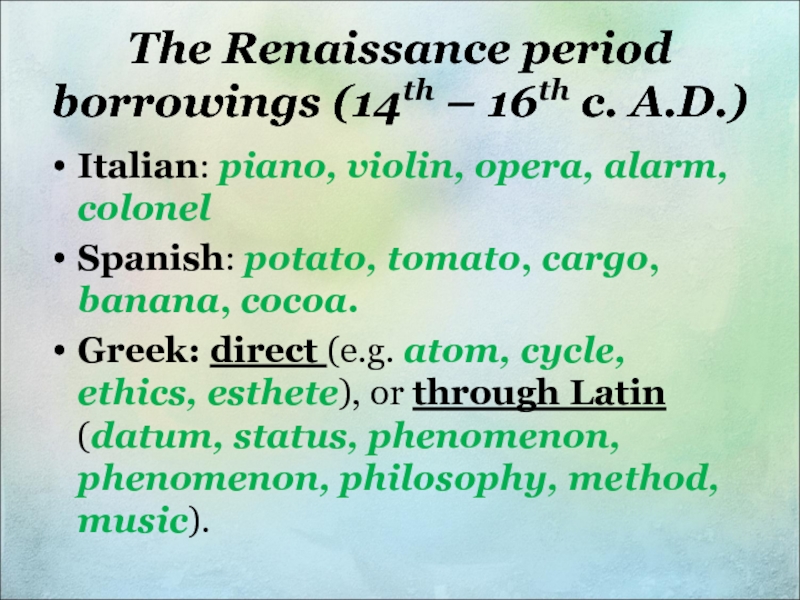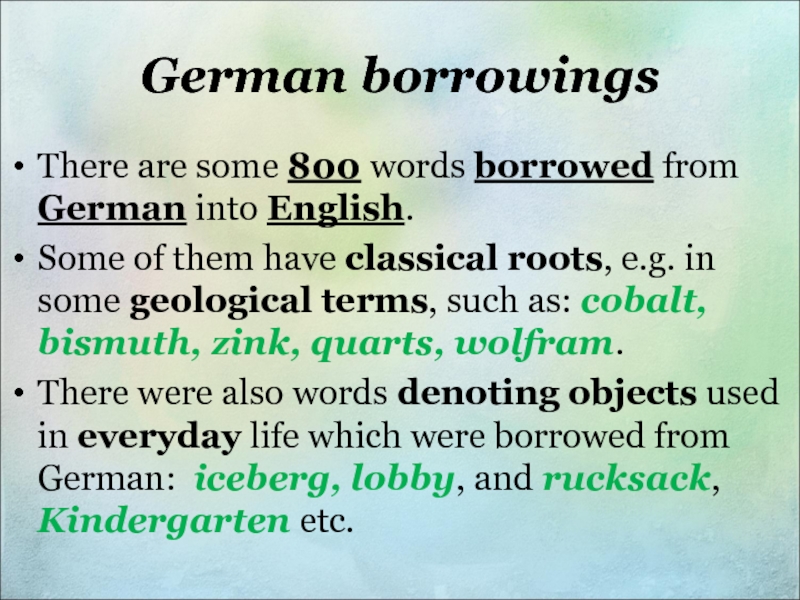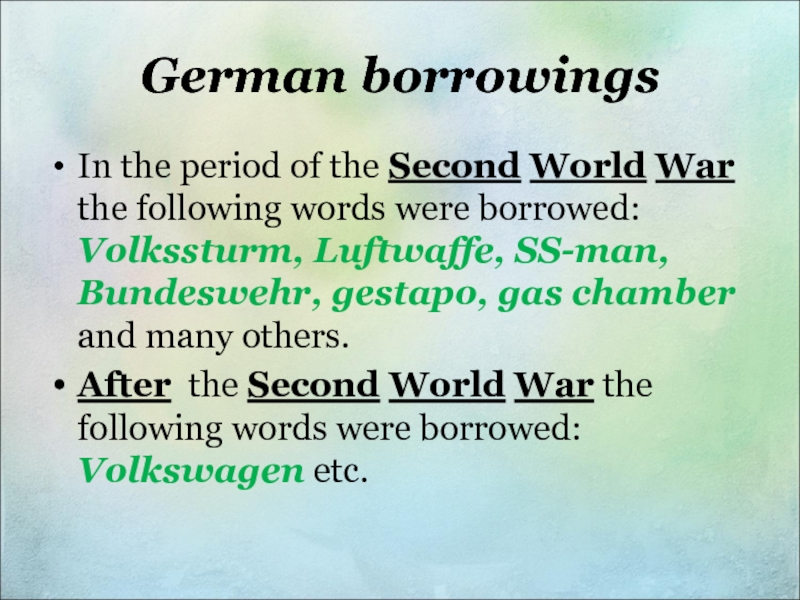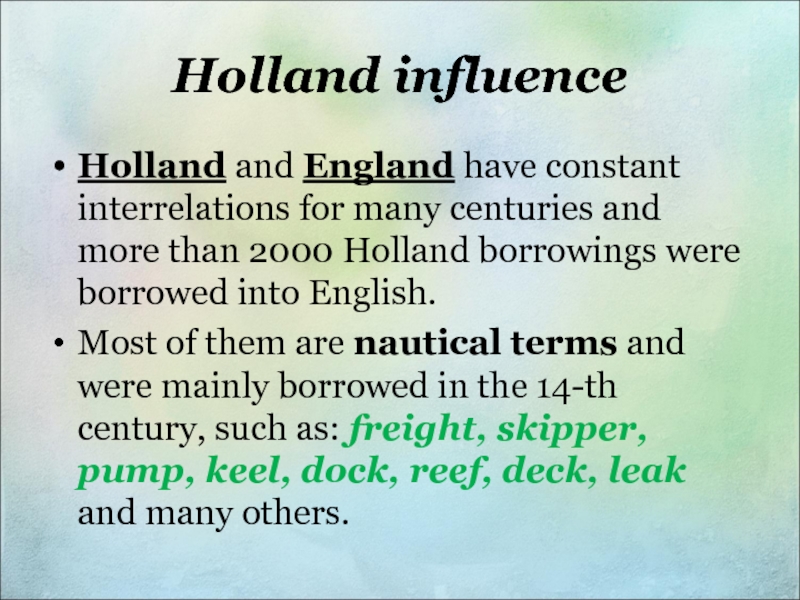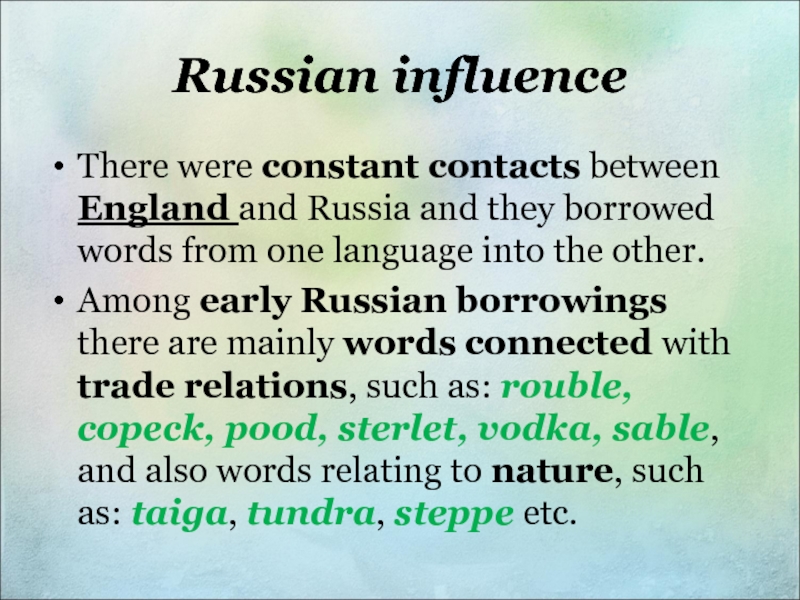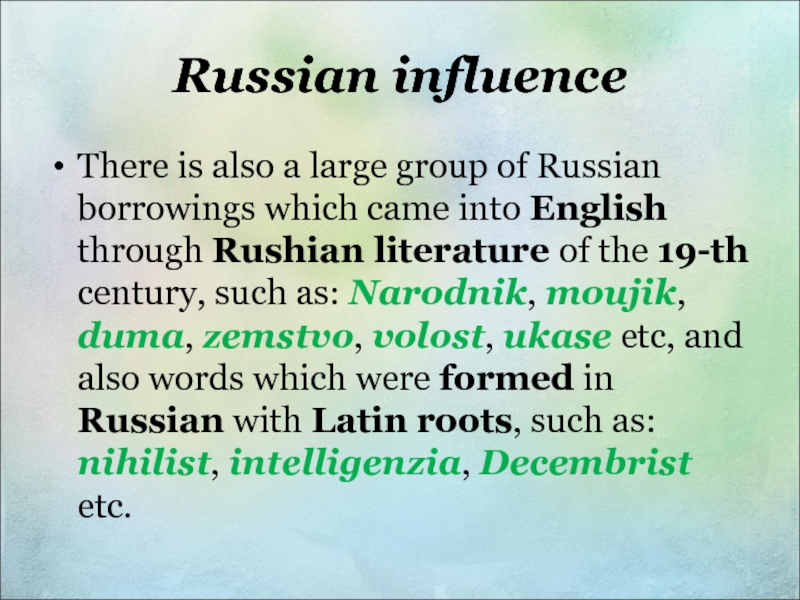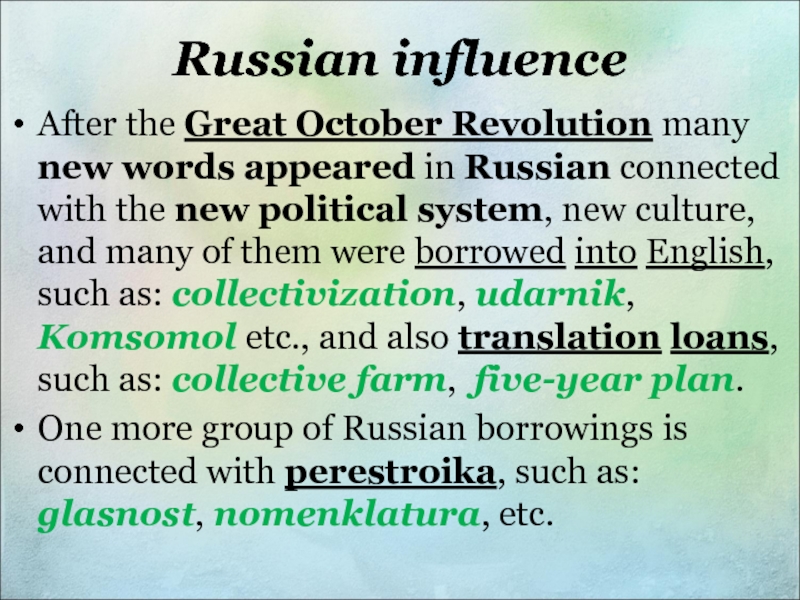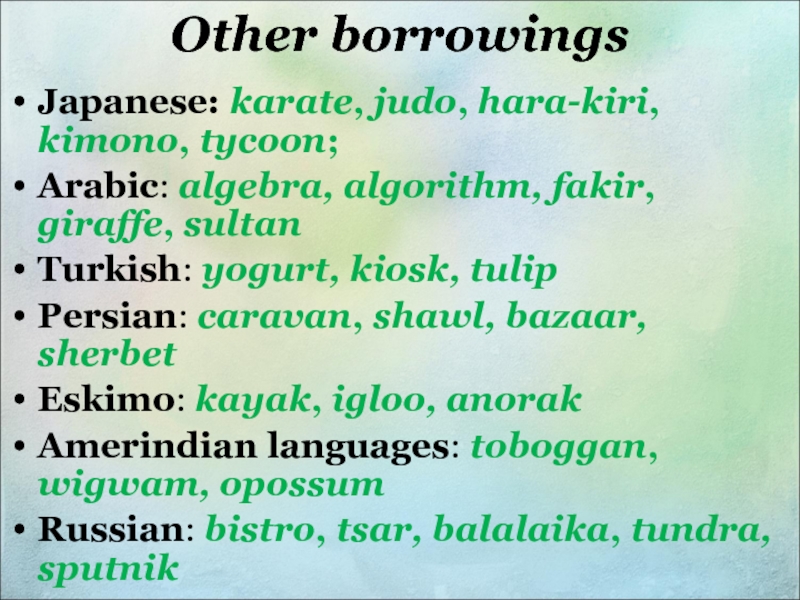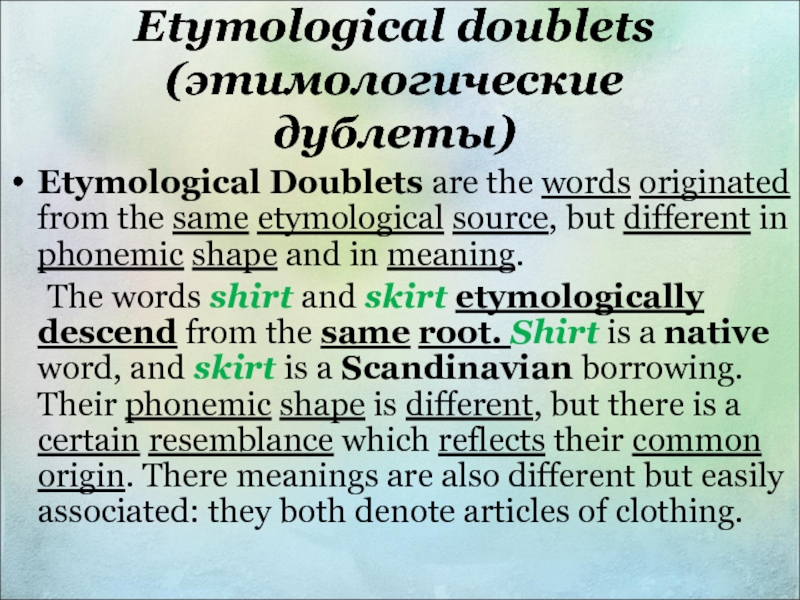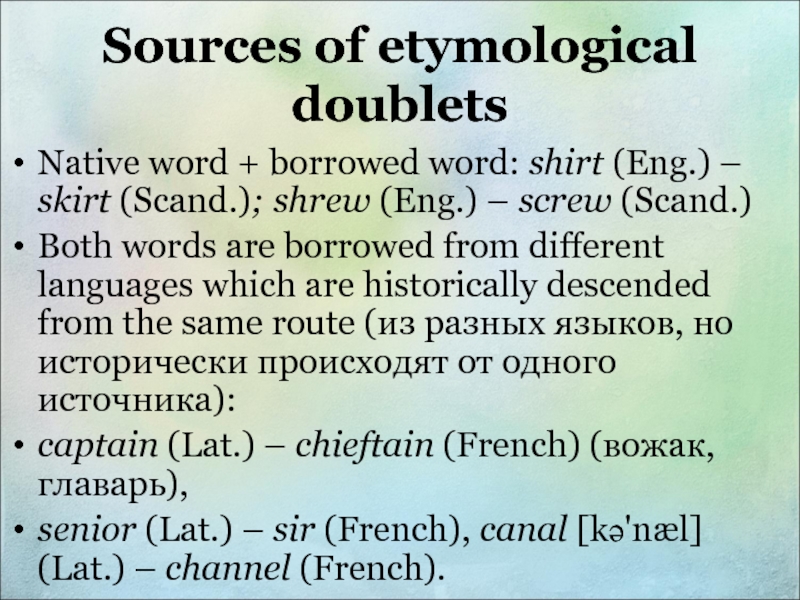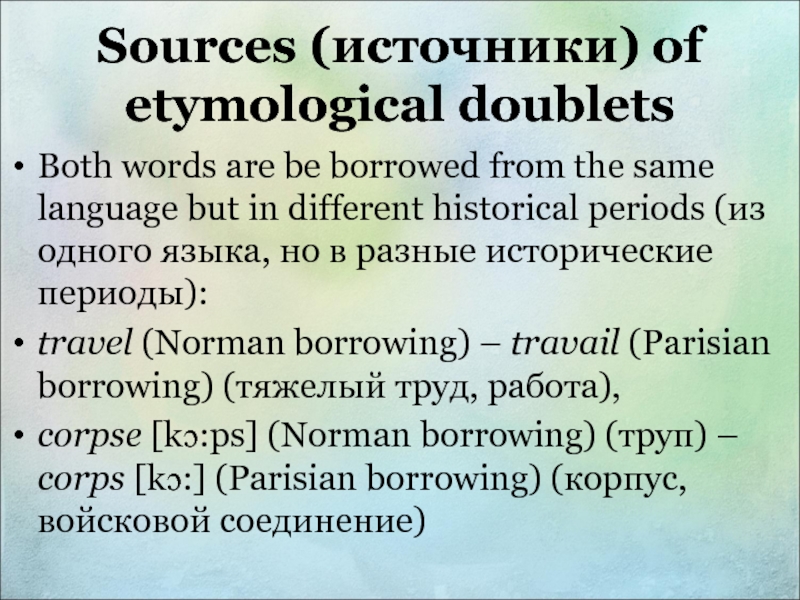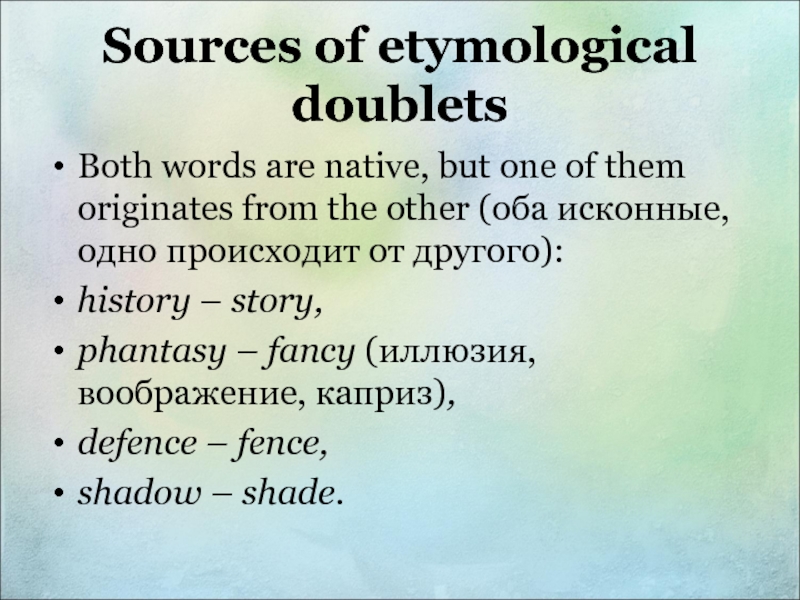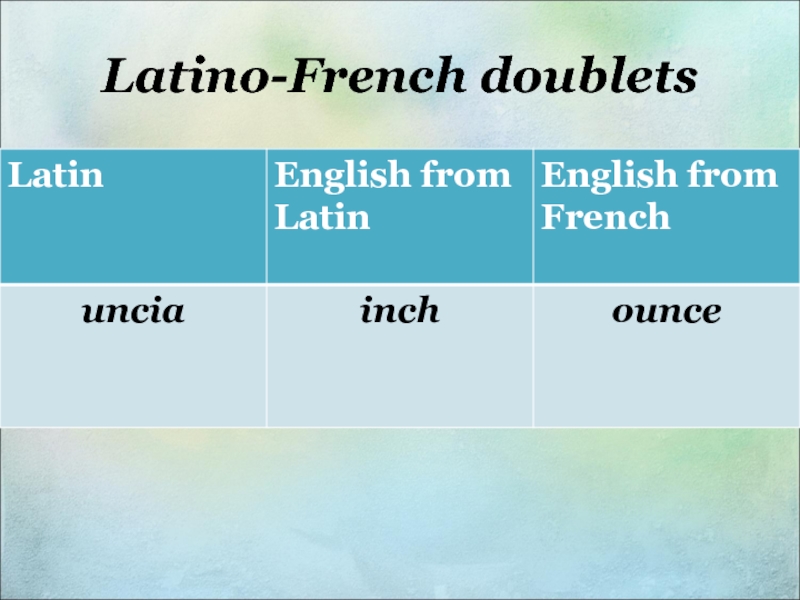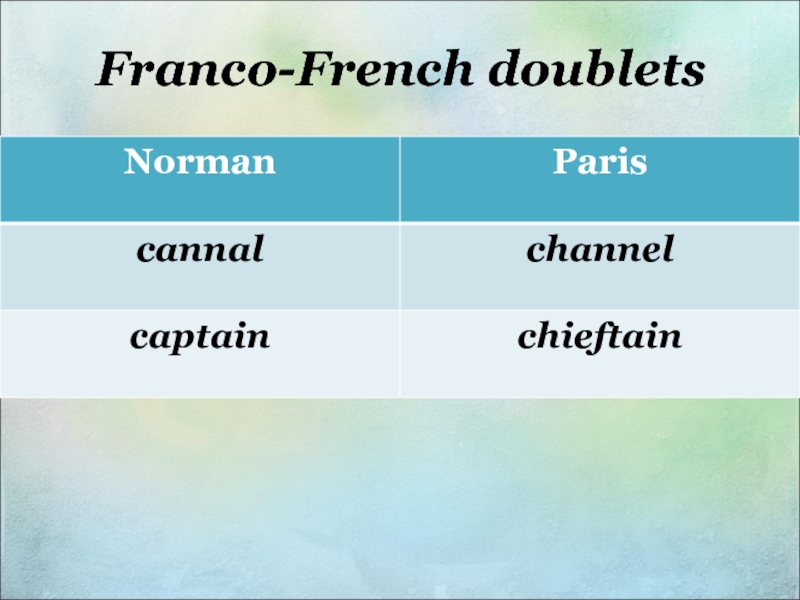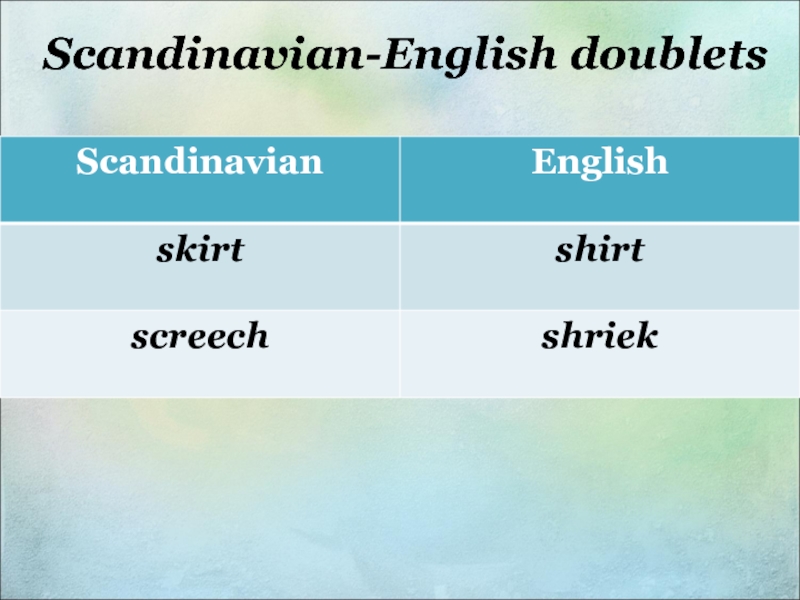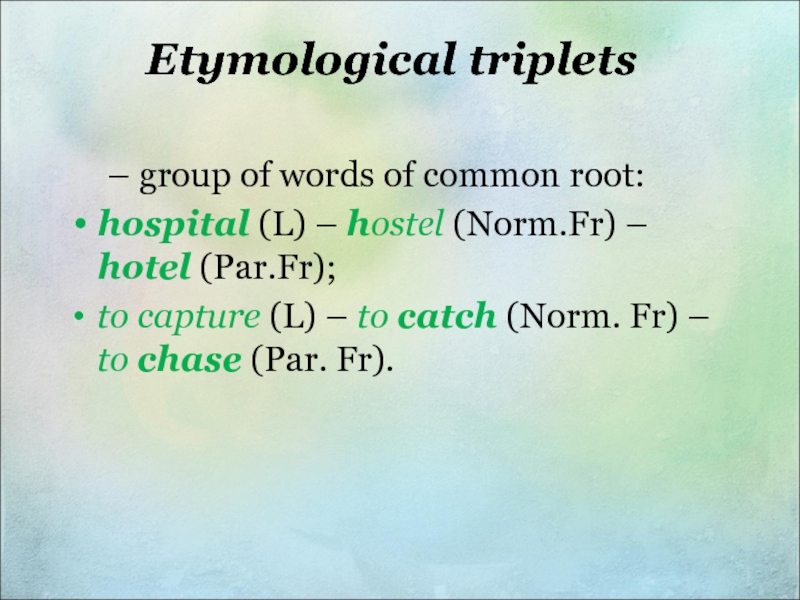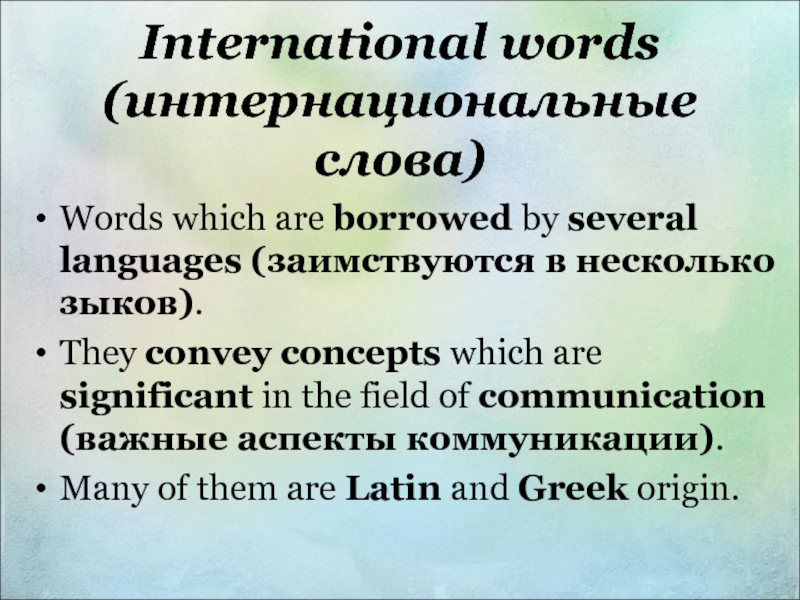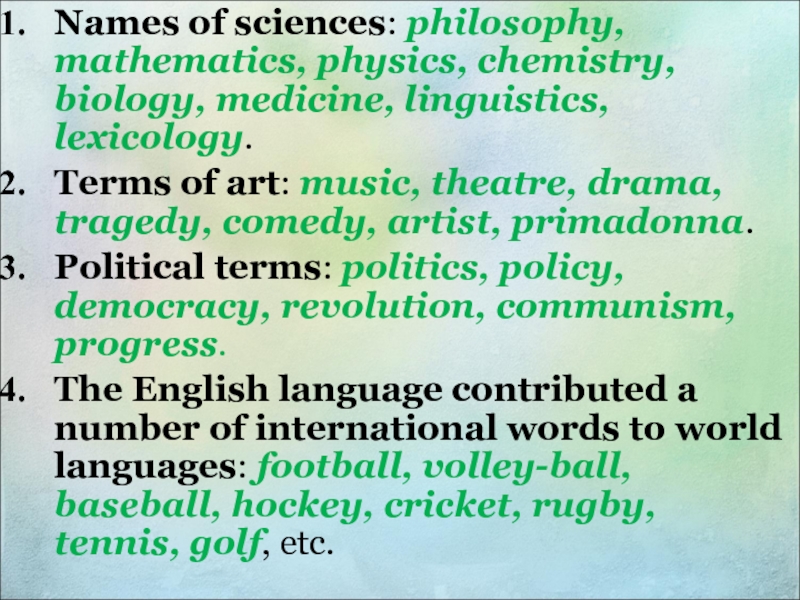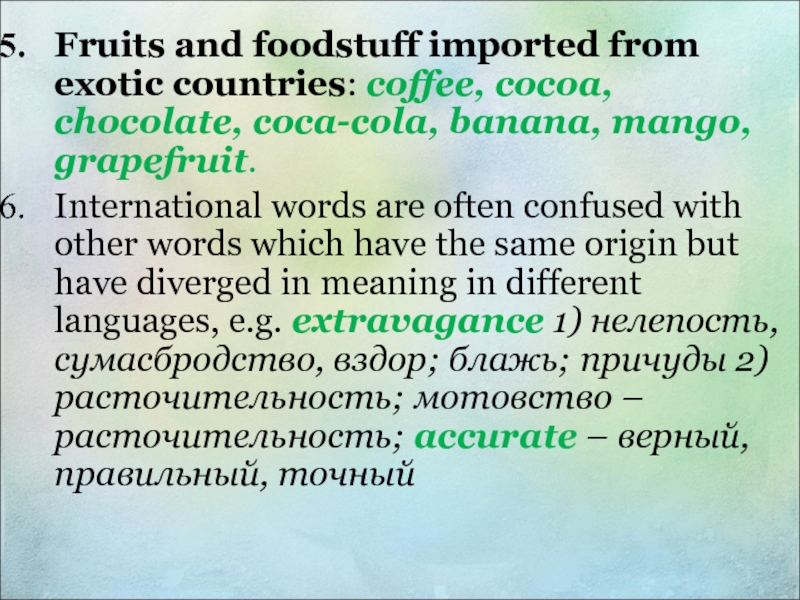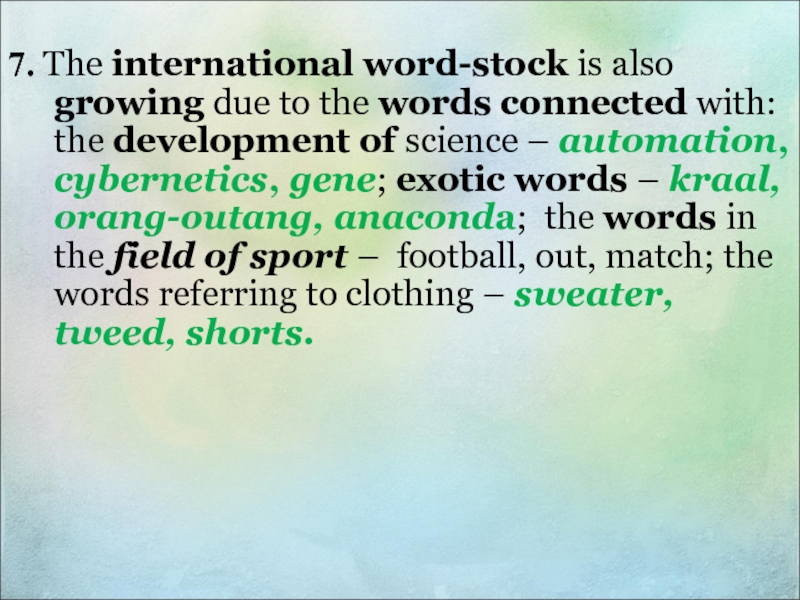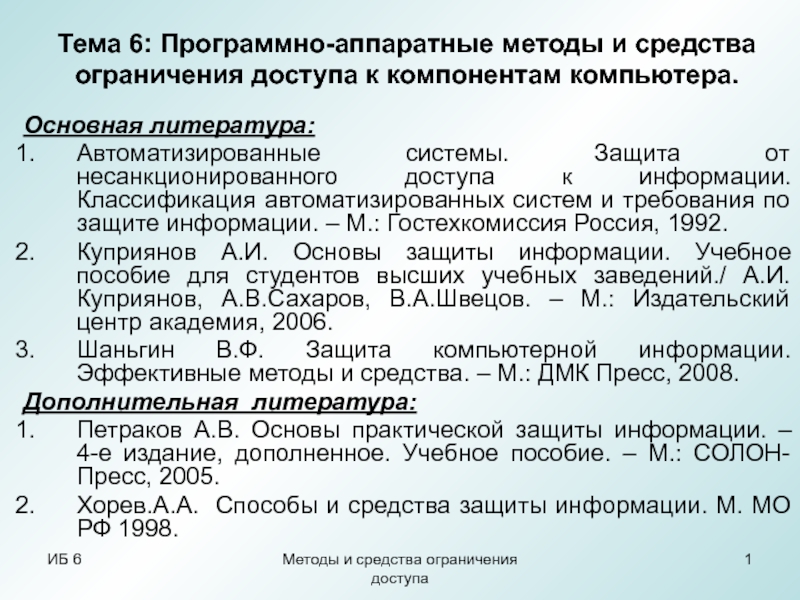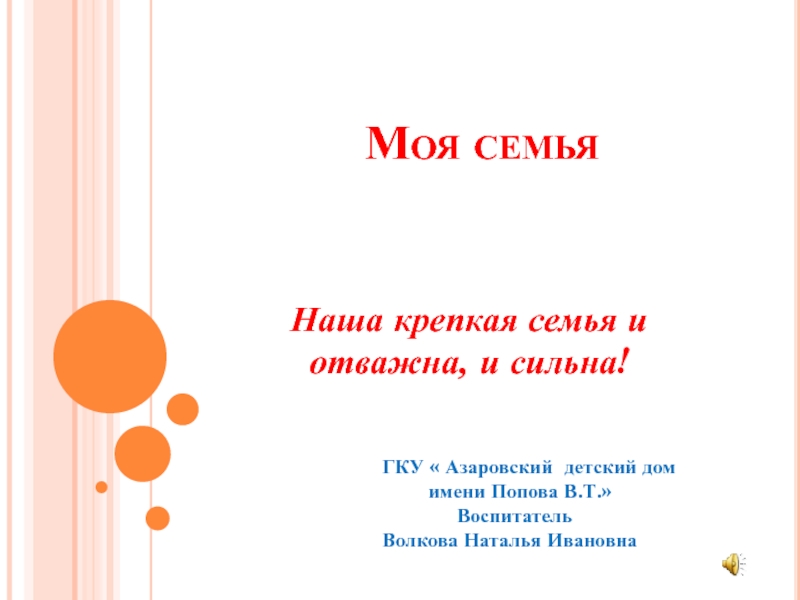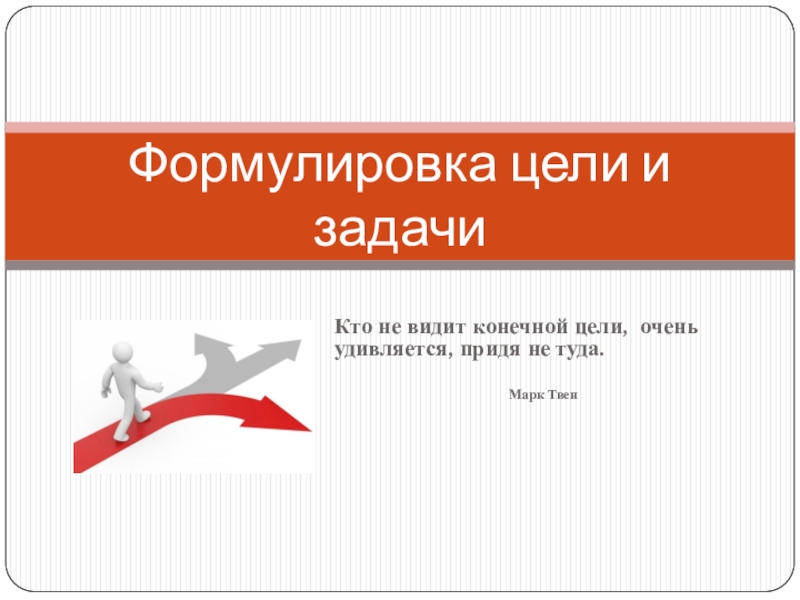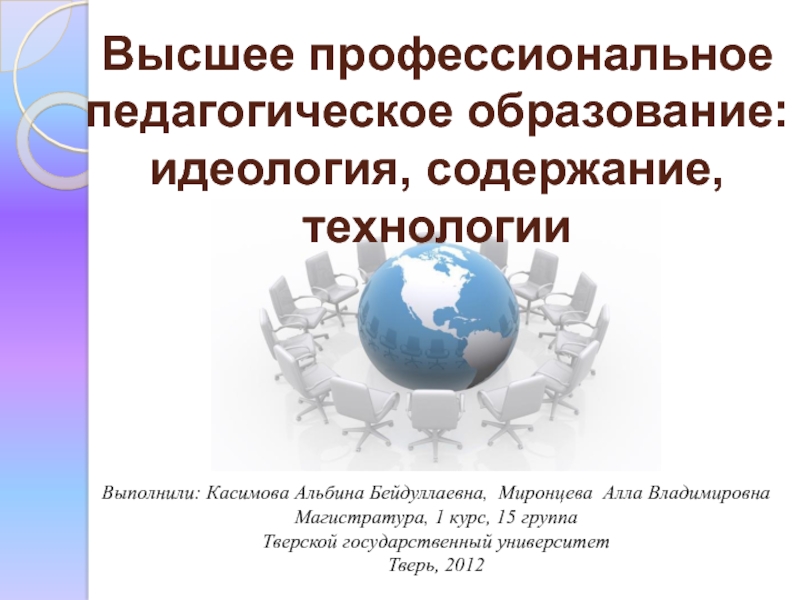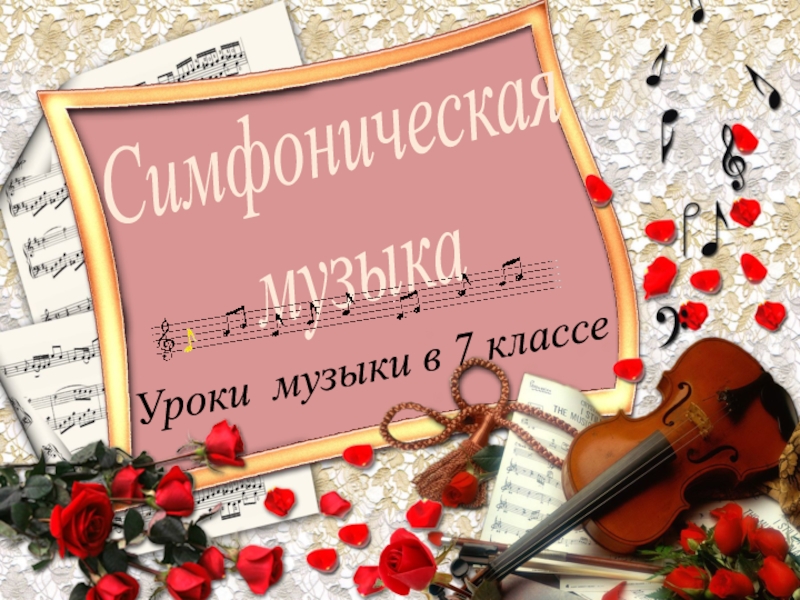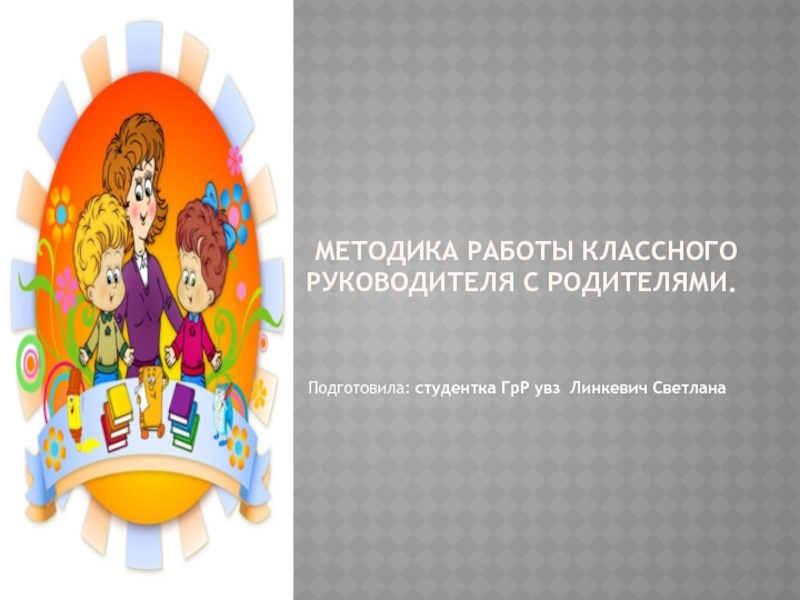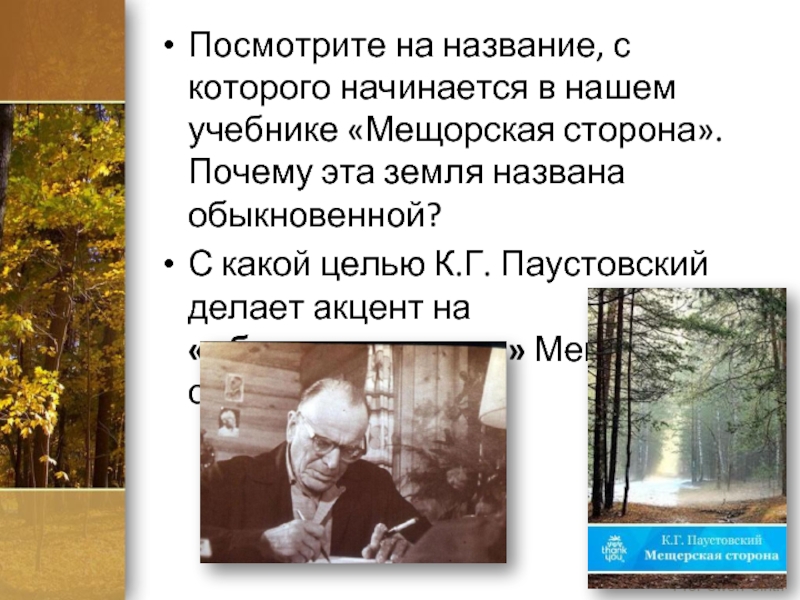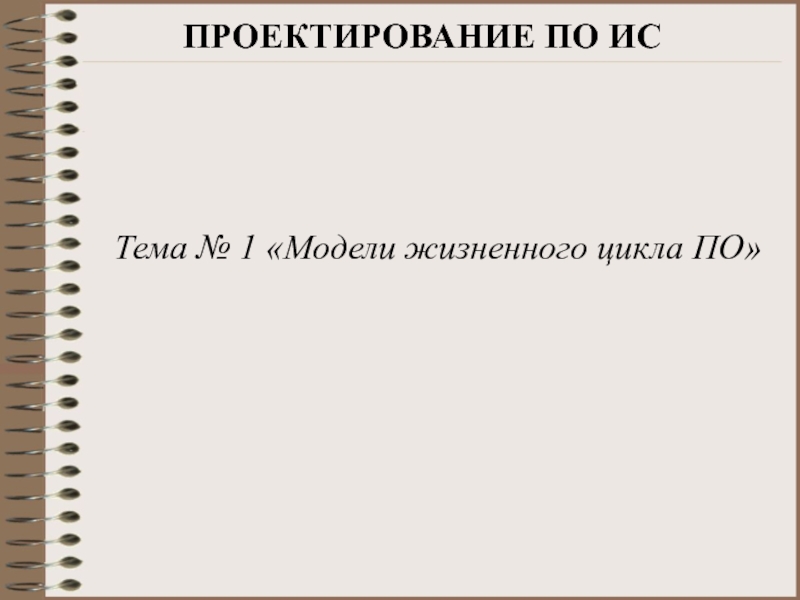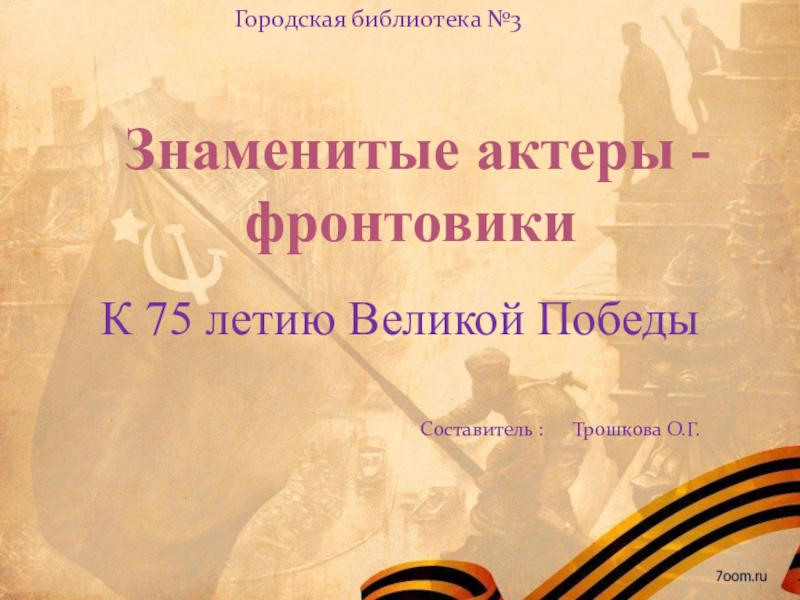Разделы презентаций
- Разное
- Английский язык
- Астрономия
- Алгебра
- Биология
- География
- Геометрия
- Детские презентации
- Информатика
- История
- Литература
- Математика
- Медицина
- Менеджмент
- Музыка
- МХК
- Немецкий язык
- ОБЖ
- Обществознание
- Окружающий мир
- Педагогика
- Русский язык
- Технология
- Физика
- Философия
- Химия
- Шаблоны, картинки для презентаций
- Экология
- Экономика
- Юриспруденция
The basics of the English language (lexicology)
Содержание
- 1. The basics of the English language (lexicology)
- 2. Lecture 9-10 – Etymology and borrowings
- 3. Etymology Отрасль лингвистики, изучающая исторические отношения между словом
- 4. Etymology of the English Word-stock Etymology (Gr.
- 5. More than two thirds (Более 2/3) of
- 6. Слайд 6
- 7. The Origins of English Words
- 8. Definitions A native word (исконное слово) is
- 9. Исконные слова (индоевропейские):kinship terms (термины родства): mother,
- 10. 5. concrete physical properties and qualities (основные
- 11. Words of the common Germanic origin (слова
- 12. parts of the human body (части тела):
- 13. abstract notions (абстрактные понятия): care, evil, hope,
- 14. Характеристики исконных словВысокая степень сочетаемости, частотность использования;Развитая семантика, полисемия;Высокий словообразовательный потенциал;Способность участвовать в создании идиом.
- 15. Исторические причины заимствованийРимское завоевание (1st c. B.C.),
- 16. The Etymology of Borrowed Words Celtic
- 17. The Etymology of Borrowed Words French
- 18. a number of Scandinavian borrowings were felt
- 19. Some of the words of this group
- 20. Пути заимствования Borrowings enter the language in
- 21. Borrowings enter the language in 2 ways:through
- 22. Классификация заимствованийBorrowings can be classified according to
- 23. Первый критерий – аспект заимствованияThere are the
- 24. Phonetic borrowings Самые частотные во всех языках
- 25. Phonetic borrowings The position of the stress
- 26. Translation borrowings (калька)Words and expressions formed from
- 27. Semantic borrowing (семантическое заимствование)It is understood as
- 28. Other types of borrowingsword coins (производные) from
- 29. Assimilation of borrowings denotes a partial or total
- 30. The degree of assimilation (степень ассимиляции)
- 31. The degree of assimilation of
- 32. Degree of AssimilationCompletely assimilated words (полностью) E.g.: wine,
- 33. Completely assimilated borrowed words (полностью)They follow all
- 34. Completely (полностью ассимилированные) assimilated borrowings are not
- 35. 2) Partially (частично) assimilated borrowed words are
- 36. 2) Partially (частично) assimilated borrowed words are
- 37. 2) Partially (частично) assimilated borrowed words are
- 38. 2) Partially assimilated borrowed words are subdivided
- 39. 3) Unassimilated borrowings or barbarisms (не ассимилированные
- 40. Classification of Borrowings according to the language
- 41. Major InfluencesCeltic - the number of celticisms
- 42. Minor InfluencesDutch The contact with the Dutch
- 43. Early InfluencesCeltic borrowings: A few Celtic words,
- 44. Celtic borrowings Place names: Avon, Exe, Esk,
- 45. Latin borrowingsAmong words of Romanic origin borrowed
- 46. Latin borrowingsMany Latin and Greek words came
- 47. Latin borrowingsLatin and Greek borrowings appeared in
- 48. Latin borrowingsClassical borrowings continue to appear in
- 49. The earliest Latin borrowings (1st c. A.D.)words
- 50. Latin words borrowed into English through
- 51. Latin borrowings of the Renaissance period (14th
- 52. Scandinavian borrowingsBy the end of the Old
- 53. Scandinavian borrowingsEven some pronouns and connective words
- 54. Scandinavian borrowings (8th - 11th c. A.D.)Verbs:
- 55. Scandinavian borrowings (place names) Derby,
- 56. Scandinavian borrowingsHowever there were also many words
- 57. Norman influenceThe largest group of borrowings are
- 58. The French Language in England 1066-1200
- 59. French is the cultivated, prestige language (престижный
- 60. English becomes the dominant language, but French
- 61. 1334-1453 The Hundred Years' War with France
- 62. Two major English poets at the end
- 63. Norman influence«v» was introduced for the voiced
- 64. Norman influencethe digraph «th» was introduced instead
- 65. Norman influencethe digraph «ou» was introduced to
- 66. Norman borrowings (11th – 13th c. A.D.)Educational
- 67. Norman borrowings (11th – 13th c. A.D.)Government
- 68. English-French PairsSheep-muttonCalf-vealDeer-venisonPig-porkBegin-commenceChild-infantDoom-judgmentFreedom-libertyHappiness-felicityHearty-cordialHelp-aidHide-concealHoly-saintlyMeal-repastStench-aromaWish-desire
- 69. Parisian borrowings: the Renaissance period and laterregime,
- 70. Words were borrowed from French into English
- 71. a) words relating to literature and music:
- 72. Italian influenceCultural and trade relations between Italy
- 73. Italian influenceWhen they suffered losses they turned
- 74. Italian influenceBut mostly Italian is famous by
- 75. Spanish influenceSpanish borrowings came into English mainly
- 76. The Renaissance period borrowings (14th – 16th
- 77. German borrowingsThere are some 800 words borrowed
- 78. German borrowingsIn the period of the Second
- 79. Holland influenceHolland and England have constant interrelations
- 80. Russian influenceThere were constant contacts between England
- 81. Russian influenceThere is also a large group
- 82. Russian influenceAfter the Great October Revolution many
- 83. Other borrowingsJapanese: karate, judo, hara-kiri, kimono, tycoon;Arabic:
- 84. Etymological doublets (этимологические дублеты)Etymological Doublets are the
- 85. Sources of etymological doubletsNative word + borrowed
- 86. Sources (источники) of etymological doubletsBoth words are
- 87. Sources of etymological doubletsBoth words are native,
- 88. Latino-French doublets
- 89. Franco-French doublets
- 90. Scandinavian-English doublets
- 91. Etymological triplets – group of words of common
- 92. Words which are borrowed by several languages
- 93. Names of sciences: philosophy, mathematics, physics, chemistry,
- 94. Fruits and foodstuff imported from exotic countries:
- 95. 7. The international word-stock is also growing
- 96. Скачать презентанцию
Слайды и текст этой презентации
Слайд 2
Lecture 9-10 – Etymology and borrowings
Plan:
Etymology
Native words
Borrowed words
Assimilation of borrowings
Sources
and classification of borrowings
Etymological doublets and International words
Слайд 3Etymology
Отрасль лингвистики, изучающая исторические отношения между словом и более ранними
формами или формой, от которых (которой) слово гипотетически произошло.
Слайд 4Etymology of the English Word-stock
Etymology (Gr. etymon “truth” + Gr.
logos “learning”) is a branch of linguistics that studies the
origin (происхождение) and history of words (историю слов), tracing them to their earliest determinable source (предпринимая попытки отследить их до самого раннего определяемого источника).Слайд 5More than two thirds (Более 2/3) of the English vocabulary
are borrowings (заимствования). Mostly they are words of Romanic origin
(Latin, French, Italian, Spanish).Borrowed words are different from native ones by their phonetic structure, by their morphological structure and also by their grammatical forms.
English history is very rich in different types of contacts with other countries, that is why it is very rich in borrowings.
Слайд 8Definitions
A native word (исконное слово) is a word which
belongs to the original English word stock (оригинальному, самому древнему
пласту) , as known from the earliest available manuscripts of the Old English period (древне английский период).A borrowed word (a borrowing, or a loan word, заимствование) is a word taken over from another language and modified in phonemic shape, spelling, paradigm or meaning according to the standards of the English language (полностью или частично модифицированное по стандартам АЯ).
Слайд 9Исконные слова (индоевропейские):
kinship terms (термины родства): mother, father, son, daughter,
brother;
important objects and phenomena of nature (самые важные природные объекты):
sun, moon, wind, water, stone, hill;animals and plants (некоторые растения и животные): goose, wolf, cow, tree, corn;
parts of human body (части тела): ear, tooth, eye, foot, heart, lip;
Слайд 105. concrete physical properties and qualities (основные прилагательные): hard, quick,
slow, red, white, new;
6. numerals from 1 to a
100 (числительные от 1 до 100): one, two, twenty, eighty;7. pronouns (personal, demonstrative, interrogative (местоимения)): I, you, he, my, that, who;
8. some of the most frequent words (наиболее частотные слова): bear, do, be, sit, stand.
Слайд 11Words of the common Germanic origin (слова общегерманские)
These words have
parallels in German, Norwegian, Dutch, Icelandic (немецкий, норвежский, голландский, исландский).
They contain a great number of semantic groups of which are the same as in the Indo-European group of native words (к ним относятся некоторые схожие категории с индоевропейскими словами):
Слайд 12parts of the human body (части тела): head, arm, finger;
periods
of time (времена года): summer, winter, time, week;
natural phenomena (природные
феномены): storm, rain, flood, ice, ground, sea, earth;artefacts and materials (артефакты и материалы): bridge, house, shop, room, coal, iron, lead, cloth;
different kinds of garment (одежда): hat, shirt, shoe;
Слайд 13abstract notions (абстрактные понятия): care, evil, hope, life, need;
animals, birds
and plants (растения и животные): sheep, horse, fox, crow, oak,
grass;various notional verbs (глаголы): bake, burn, drive, buy, hear, keep, learn, make, rise;
adjectives of colour, size, etc (прилагательные): broad, dead, deaf, deep, grey, blue;
adverbs (наречия): down, out, before.
Слайд 14
Характеристики исконных слов
Высокая степень сочетаемости, частотность использования;
Развитая семантика, полисемия;
Высокий словообразовательный
потенциал;
Способность участвовать в создании идиом.
Слайд 15Исторические причины заимствований
Римское завоевание (1st c. B.C.),
Введение Христианства (7th
c. A.D.),
Набеги датчан (11th – 13th c. A.D.),
Норманнское завоевание
(1066 A.D.), Эпоха Возрождения (14th – 16th c. A.D.),
Прямые языковые контакты и политические культурные и т.д. отношения между разными странами (современный период)
Слайд 16
The Etymology of Borrowed Words
Celtic (Кельтские): 5th – 6th A. D.
Latin
(Латинские):
1st layer: 1st c. B. C. (Римское завоевание)
2nd layer: 7th c. A. D. (the
introduction of Christianity (Христианство))3rd layer: 14th – 16th c. (the Renaissance period (Возрождение))
Scandinavian (скандинавские): 8th – 11th c. A. D.
Слайд 17
The Etymology of Borrowed Words
French (Французские):
Norman borrowings: 11th – 13th
A. D.
Parisian borrowings: the Renaissance period
Greek: the Renaissance period
Italian: the Renaissance
period and laterSpanish: the Renaissance period and later
Russian: the Renaissance period and later
German, Indian and other languages
Слайд 18a number of Scandinavian borrowings were felt as derived from
native words (they were of the same root and the
connection between them was easily seen), for example, drop (AS.) – drip (Scand.), true (AS.)-tryst (Scand.).Here are some examples of early Scandinavian borrowings: call (v), take (v), cast (v), die (v), law (n), husband (n), window (n), ill (adj), loose (adj), low (adj), weak (adj).
Слайд 19Some of the words of this group are easily recognisable
as Scandinavian borrowings by the initial sk- combination:
sky, skill,
skin, ski, skirt etc.Слайд 20Пути заимствования
Borrowings enter the language in 2 ways:
through oral
speech – через устную речь (by immediate contact between the
peoples).They took place in the early periods (ранние) of history.
They are usually short (краткие) and undergo considerable changes in the act of adoption (наиболее подвержены ассимиляции и часто неотличимы от исконных слов, не ощущаются как чужеродные).
Слайд 21Borrowings enter the language in 2 ways:
through written speech –
через письменную речь (by indirect contact through books, etc.).
They
gained importance in recent times (более современные). They preserve their spelling and some peculiarities of their sound-form (часто сохраняют изначальное написание, звучание), their assimilation is long and laborious process (долго и незначительно ассимилируются).
Слайд 22Классификация заимствований
Borrowings can be classified according to different criteria:
a)
according to the aspect which is borrowed (аспект заимствования);
b)
according to the degree of assimilation (степень ассимиляции); c) according to the language from which the word was borrowed (язык заимствования).
Слайд 23Первый критерий – аспект заимствования
There are the following groups:
phonetic
borrowings (loan words proper) (фонетические),
translation loans (переводные кальки),
semantic
borrowings (семантические заимствования), word coins (производные),
morphemic borrowings (заимствование морфем).
Слайд 24Phonetic borrowings
Самые частотные во всех языках мира, называются loan
words proper (идеальные заимствования).
Слова заимствуются с их написанием, произношением,
значением, проходят процесс ассимиляции, каждый звук изначального языка заменяется на соответствующий звук языка-реципиента)Иногда написание полностью меняется, может меняться также и семантическая структура
Слайд 25Phonetic borrowings
The position of the stress is very often
influenced by the phonetic system of the borrowing language (перенос
ударения по правилам языка-реципиента).The paradigm of the word, sometimes the meaning of the borrowed word are also changed (грамматика может меняться).
labour, travel, table, chair, people (French); nomenklatura, sputnik (Russian); bank, soprano (Italian).
Слайд 26Translation borrowings (калька)
Words and expressions formed from the material already
existing in the English language (формируются из существующих слов) according
to patterns taken from another language (по моделям другого языка), by way of literal morpheme-for-morpheme or word-for-word translation (пословный или поморфемный перевод,mother tongue
Слайд 27Semantic borrowing (семантическое заимствование)
It is understood as the development in
an English word (развитие в английском слове нового значения) of
a new meaning under the influence of a related word in another language (под влиянием сходного слова другого языка)e.g. the English word pioneer means ‘explorer’ and ‘one who is among the first in new fields of activity’. Under influence of the Russian word пионер it has come to mean ‘a member of the Young Pioneers’ Organization’.
Слайд 28Other types of borrowings
word coins (производные) from Latin and Greek
– are formed to denote new notions or inventions using
Latin or Greek words (telephone)morphemic borrowings – first a number of words with the morpheme is taken from another language, then the morpheme begins to form new words (-able- Latin; -ment- French; -ism- Greek).
Слайд 29Assimilation of borrowings
denotes a partial or total confrontation (частичное или
полное влияние) to the phonetical, graphical and morphological standards of
the English language and its semantic system.Слайд 30 The degree of assimilation (степень ассимиляции) of borrowings depends
on the following factors:
a) from what group of languages
the word was borrowed (if the word belongs to the same group of languages to which the borrowing language belongs it is assimilated easier) – принадлежность одной группе = более быстрая ассимиляция; b) in what way the word is borrowed: orally or in the written form (words borrowed orally are assimilated quicker) – заимствованные устно = более быстрая ассимиляция;
Слайд 31 The degree of assimilation of borrowings depends on
the following factors:
c) how often the borrowing is used
in the language (the greater the frequency of its usage, the quicker it is assimilated) – частота использования в языке = более быстрая ассимиляция; d) how long the word lives in the language (the longer it lives, the more assimilated it is) – длительное существование слова в языке = более быстрая ассимиляция.
Слайд 32Degree of Assimilation
Completely assimilated words (полностью)
E.g.: wine, window, chair.
2)
Partially assimilated words (частично) a. Loan words not assimilated semantically
E.g.: sari, toreador. b. Loan words not assimilated grammatically E.g.: formula, index, phenomenon. c. Loan words not assimilated phonetically or graphically. E.g.: ballet, buffet, café.Unassimilated (не ассимилированные) E.g. haute couture. The words from other languages for which there are corresponding English equivalents are so-called barbarisms. E.g.: ciao.
Слайд 33Completely assimilated borrowed words (полностью)
They follow all morphological, phonetical and
orthographic standards (соответствуют стандарту языка-реципиента).
They take part in word-formation
(участвуют в словообразовании). Their morphological structure and motivation is transparent (мотивированны).
They are found in all layers of older borrowings: cheese (L.), husband (Sc.), animal (L.)
Слайд 34Completely (полностью ассимилированные) assimilated borrowings are not felt as foreign
words in the language (не ощущаются чужеродными).
Completely assimilated verbs
belong to regular verbs: correct – corrected. Completely assimilated nouns form their plural by means of s-inflexion: gate – gates.
In completely assimilated French words the stress has been shifted from the last syllable to the first one: capital, service.
Слайд 352) Partially (частично) assimilated borrowed words are subdivided into:
borrowings not
completely assimilated graphically (не полностью ассимилированные в графике).
These are
words from French, in which the final consonant is not read: ballet, buffet; with a diacritic mark: café, cliché; diagraphs ch, qu, ou, etc.: bouquet, banquet.Слайд 362) Partially (частично) assimilated borrowed words are subdivided into:
borrowings not
completely assimilated phonetically (не полностью ассимилированные в фонетике).
e.g. from
French with the stress on the final syllable: machine, cartoon, police, bourgeois,
prestige, regime.
Слайд 372) Partially (частично) assimilated borrowed words are subdivided into:
borrowings not
completely assimilated grammatically (не полностью ассимилированные в грамматике).
e.g., nouns
from Latin and Greek keep their original plural forms: phenomenon – phenomena;
criterion – criteria.
Слайд 382) Partially assimilated borrowed words are subdivided into:
borrowings not completely
assimilated semantically because they denote objects and notions peculiar to
the country from which they come, e.g.sari, sombrero, rickshaw (Ch), sherbet (Arab), etc.
Слайд 393) Unassimilated borrowings or barbarisms (не ассимилированные = варваризмы)
are words
from other languages used by English people, e.g.
ciao –
‘good-bye’ or tête-à-tête. Слайд 40Classification of Borrowings according to the language from which they
were Borrowed
Romanic (Latin, Greek),
French,
Italian,
Spanish,
Scandinavian,
German,
Dutch,
Russian
Слайд 41Major Influences
Celtic - the number of celticisms in English is
small.
Scandinavian - the years 750 - 1050 are known as
The Viking Age of England. Their influence upon the language was strong. Norman and French - the Norman period lasted nearly 300 years.
Latin and Greek
The first period of Latin influence was during the Roman occupation.
The second wave of the influence came with the christianization.
The third wave dated to the 14th, 15th, and 16th centuries - the period of New Learning, when Greek and Latin were established as the main languages of learning, science, and culture.
Слайд 42Minor Influences
Dutch
The contact with the Dutch language was mediated by
the political, commercial, and cultural contacts; thus the main spheres
were maritime terminology (dock, gin, commodore, etc.), and terminology of drawing and painting (sketch, landscape).Italian Main spheres are business (bank, risk, bankrupt, etc.), music, and architecture.
Others Spanish, German, Russian, Czech, Indian, Japanese, Red Indian, etc.
Слайд 43Early Influences
Celtic borrowings: A few Celtic words, such as crag,
entered what would become the English language.
Latin loans: Roman soldiers
and priests came to the British Isles before the massive invasions of Northern Europeans.Слайд 44Celtic borrowings
Place names: Avon, Exe, Esk, Usk, Ux (Celtic
“river”, “water”); London (Llyn “river”+ dun “a fortified hill”) -
“a fortress on the hill over the river”cradle, cross, iron, flannel, tweed, lake (C. loch)
Слайд 45Latin borrowings
Among words of Romanic origin borrowed from Latin during
the period when the British Isles were a part of
the Roman Empire, there are such words as: street, port, wall etc.Слайд 46Latin borrowings
Many Latin and Greek words came into English during
the Adoption of Christianity in the 6-th century.
At this
time the Latin alphabet was borrowed which ousted the Runic alphabet. These borrowings are usually called classical borrowings. Here belong Latin words: alter, cross, dean, and Greek words: church, angel, devil, anthem.
Слайд 47Latin borrowings
Latin and Greek borrowings appeared in English during the
Middle English period due to the Great Revival of Learning.
These are mostly scientific words because Latin was the language of science at the time. These words were not used as frequently as the words of the Old English period, therefore some of them were partly assimilated grammatically, e.g. formula - formulae. Here also belong such words as: memorandum, minimum, maximum, veto etc.
Слайд 48Latin borrowings
Classical borrowings continue to appear in Modern English as
well. Mostly they are words formed with the help of
Latin and Greek morphemes.In medicine (appendicitis, aspirin), in chemistry (acid, valency), in technique (engine, antenna, biplane), in politics (socialism, militarism), names of sciences (zoology, physics). In philology most of terms are of Greek origin (homonym, archaism, lexicography).
Слайд 49The earliest Latin borrowings (1st c. A.D.)
words denoting things connected
with war, trade, building and domestic life: pound, inch, cup,
kitchen, pepper, butter, cheese, milk, wine, cherryСлайд 50 Latin words borrowed into English through the Christianization of England
(7th c. A.D.)
persons, objects and ideas associated with church
and religious rituals: priest, bishop, monk, nun, candle, templewords connected with learning: grammar, school, scholar, decline, master, magister
Слайд 51Latin borrowings of the Renaissance period (14th – 16th c.
A.D.)
abstract words: major, minor, filial, moderate, intelligent, permanent, to
elect, to create. Слайд 52Scandinavian borrowings
By the end of the Old English period English
underwent a strong influence of Scandinavian due to the Scandinavian
conquest of the British Isles.Scandinavians belonged to the same group of peoples as Englishmen and their languages had much in common (много общего).
As the result of this conquest there are about 700 borrowings from Scandinavian into English.
Слайд 53Scandinavian borrowings
Even some pronouns and connective words were borrowed which
happens very seldom, such as: same, both, till, fro, though,
pronominal forms with «th»: they, them, their.Scandinavian influenced the development of phrasal verbs, which did not exist in Old English (фразовые глаголы).
Phrasal verbs (фразовые глаголы) are now highly productive in English /take off, give in etc/.
Слайд 54Scandinavian borrowings (8th - 11th c. A.D.)
Verbs: call, take, cast,
die, want
Nouns: law, egg, husband (Sc. hūs + bōndi “inhabitant
of the house”), window (Sc. vindauga “the eye of the wind”) Adjectives: ill, loose, low, weak
Pronouns and pronominal forms: they, their, them, same, both, though.
Слайд 55
Scandinavian borrowings (place names)
Derby, Tremsby (-by: Sc. “village, town”);
Zinthorp, Altharp (-thorp: Sc. “village”);
Eastoft, Nortoft (-toft: Sc. “a plot
of land covered with grass”);Troutbeck (-beck: Sc. “brook”);
Inverness (-ness: Sc. “cape”);
Applethwait, Crossthwait (-thwait: Sc. “forest glade”)
Слайд 56Scandinavian borrowings
However there were also many words in the two
languages which were different, and some of them were borrowed
into English,such nouns as: bull, cake, egg, kid, knife, skirt, window etc,
such adjectives as: flat, ill, happy, low, odd, ugly, wrong,
such verbs as : call, die, guess, get, give, scream and many others.
Слайд 57Norman influence
The largest group of borrowings are French borrowings. Most
of them came into English during the Norman Conquest (норманнское
завоевание).French influenced not only the vocabulary of English but also it’s spelling, because French scribes wrote documents as the local population was mainly illiterate, and the ruling class was French (влияние на правописание).
Слайд 58The French Language in England
1066-1200
Norman French is the
native language of the nobility (французский – язык аристократии, верхушки
государства).Probably not a great deal of bilingualism (малая степень билингвизма).
Small numbers of French loans enter English (небольшое количество заимствований).
Слайд 59French is the cultivated, prestige language (престижный язык).
There is a
diglossic situation, with French the high-prestige, English the low-prestige variety
(диглоссия, французский престижный, английский – нет).Large numbers of French loans enter English (большое количество заимствований)
The French Language in England
1200-1300
Слайд 60English becomes the dominant language, but French remains dominant in
literature and at the court (английский начинает доминировать).
Although the knowledge
of French is waning, its linguistic prestige can be seen by still increasing numbers of French loans in English (заимствования продолжаются). The French Language in England
1300-1400
Слайд 611334-1453 The Hundred Years' War with France (война с Францией).
1348-9 The Black Death. 30% mortality. Labour shortage, wage rises,
increasing importance of the English-speaking classes (эпидемия чумы = необходимость в трудовом населении (англоязычные))1386 English accepted in the courts ('Statute of Pleading') – признание английского в суде
The French Language in England
1300-1400
Factors contributing to the decline of French (почему французский уступил):
Слайд 62Two major English poets at the end of the 14th
century:
Gower writes mostly in French (but composes one long
work Confessio amantis, in English) Chaucer writes almost entirely in English.
Evidence of private letters:
1350: French is the rule.
After 1400: English becomes common.
After 1450: English is the rule.
Расцвет англоязычной культуры и поэзии
The French Language in England
1300-1400
Factors contributing to the decline of French (почему французский уступил):
Слайд 63Norman influence
«v» was introduced for the voiced consonant /v/ instead
of «f» in the intervocal position /lufian - love/,
the
digraph «ch» was introduced to denote the sound /ch/ instead of the letter «c» / chest/ before front vowels where it had been palatalized, the digraph «sh» was introduced instead of the combination «sc» to denote the sound /sh/ /ship/,
Слайд 64Norman influence
the digraph «th» was introduced instead of the Runic
letter «ð» /this, thing/,
the letter «y» was introduced instead
of the Runic letter «3» to denote the sound /j/ /yet/, the digraph «qu» substituted the combination «cw» to denote the combination of sounds /kw/ /queen/,
Слайд 65Norman influence
the digraph «ou» was introduced to denote the sound
/u:/ /house/ (The sound /u:/ was later on diphthongized and
is pronounced /au/ in native words and fully assimilated borrowings).As it was difficult for French scribes to copy English texts they substituted the letter «u» before «v», «m», «n» and the digraph «th» by the letter «o» to escape the combination of many vertical lines /«sunu» - «son», luvu» - «love»/.
Слайд 66Norman borrowings (11th – 13th c. A.D.)
Educational terms: pupil, lesson,
library, science, pen, pencil
Artistic and literary terms: image, character, figure,
volume, designTerms of everyday life: chair, table, plate, saucer, dinner, supper, breakfast
Слайд 67Norman borrowings (11th – 13th c. A.D.)
Government and administration: state,
country, government, parliament, prince, baron
Legal terms: court, judge, justice, crime,
prison, juryReligious terms: saint, sermon (проповедь), prayer, parish (приход), chapel
Military terms: army, war, soldier, officer, battle, enemy
Слайд 68English-French Pairs
Sheep-mutton
Calf-veal
Deer-venison
Pig-pork
Begin-commence
Child-infant
Doom-judgment
Freedom-liberty
Happiness-felicity
Hearty-cordial
Help-aid
Hide-conceal
Holy-saintly
Meal-repast
Stench-aroma
Wish-desire
Слайд 69Parisian borrowings: the Renaissance period and later
regime, routine, police, machine,
ballet, matinée, scene, technique, bourgeois, etc.
Слайд 70
Words were borrowed from French into English after 1650, mainly
through French literature, but they were not as numerous and
many of them are not completely assimilated.There are the following semantic groups of these borrowings:
Слайд 71a) words relating to literature and music: belle-lettres, conservatorie, brochure,
nuance, piruette, vaudeville;
b) words relating to military affairs: corps,
echelon, fuselage, manouvre; c) words relating to buildings and furniture: entresol, chateau, bureau;
d) words relating to food and cooking: ragout, cuisine.
Слайд 72Italian influence
Cultural and trade relations between Italy and England brought
many Italian words into English.
The earliest Italian borrowing came
into English in the 14-th century, it was the word «bank» /from the Italian «banko» - «bench»/. Italian moneylenders and moneychangers sat in the streets on benches. Слайд 73Italian influence
When they suffered losses they turned over their benches,
it was called «banco rotta» from which the English word
«bankrupt» originated.In the 17-th century some geological terms were borrowed: volcano, granite, bronze, lava.
At the same time some political terms were borrowed: manifesto, bulletin.
Слайд 74Italian influence
But mostly Italian is famous by its influence in
music and in all Indo-European languages musical terms were borrowed
from Italian: alto, baritone, basso, tenor, falsetto, solo, duet, trio, quartet, quintet, opera, operetta, libretto, piano, violin.Among the 20-th century Italian borrowings we can mention: gazette, incognito, altostrati, fiasco, fascist, dilettante, grotesque, graffitto etc.
Слайд 75Spanish influence
Spanish borrowings came into English mainly through its American
variant. There are the following semantic groups of them:
a) trade
terms: cargo, embargo; b) names of dances and musical instruments: tango, rumba, habanera, guitar;
c) names of vegetables and fruit: tomato, potato, tobacco, cocoa, banana, ananas, apricot etc.
Слайд 76The Renaissance period borrowings (14th – 16th c. A.D.)
Italian: piano,
violin, opera, alarm, colonel
Spanish: potato, tomato, cargo, banana, cocoa.
Greek:
direct (e.g. atom, cycle, ethics, esthete), or through Latin (datum, status, phenomenon, phenomenon, philosophy, method, music). Слайд 77German borrowings
There are some 800 words borrowed from German into
English.
Some of them have classical roots, e.g. in some
geological terms, such as: cobalt, bismuth, zink, quarts, wolfram. There were also words denoting objects used in everyday life which were borrowed from German: iceberg, lobby, and rucksack, Kindergarten etc.
Слайд 78German borrowings
In the period of the Second World War the
following words were borrowed: Volkssturm, Luftwaffe, SS-man, Bundeswehr, gestapo, gas
chamber and many others.After the Second World War the following words were borrowed: Volkswagen etc.
Слайд 79Holland influence
Holland and England have constant interrelations for many centuries
and more than 2000 Holland borrowings were borrowed into English.
Most of them are nautical terms and were mainly borrowed in the 14-th century, such as: freight, skipper, pump, keel, dock, reef, deck, leak and many others.
Слайд 80Russian influence
There were constant contacts between England and Russia and
they borrowed words from one language into the other.
Among early
Russian borrowings there are mainly words connected with trade relations, such as: rouble, copeck, pood, sterlet, vodka, sable, and also words relating to nature, such as: taiga, tundra, steppe etc.Слайд 81Russian influence
There is also a large group of Russian borrowings
which came into English through Rushian literature of the 19-th
century, such as: Narodnik, moujik, duma, zemstvo, volost, ukase etc, and also words which were formed in Russian with Latin roots, such as: nihilist, intelligenzia, Decembrist etc.Слайд 82Russian influence
After the Great October Revolution many new words appeared
in Russian connected with the new political system, new culture,
and many of them were borrowed into English, such as: collectivization, udarnik, Komsomol etc., and also translation loans, such as: collective farm, five-year plan.One more group of Russian borrowings is connected with perestroika, such as: glasnost, nomenklatura, etc.
Слайд 83Other borrowings
Japanese: karate, judo, hara-kiri, kimono, tycoon;
Arabic: algebra, algorithm, fakir,
giraffe, sultan
Turkish: yogurt, kiosk, tulip
Persian: caravan, shawl, bazaar, sherbet
Eskimo: kayak,
igloo, anorak Amerindian languages: toboggan, wigwam, opossum
Russian: bistro, tsar, balalaika, tundra, sputnik
Слайд 84Etymological doublets (этимологические дублеты)
Etymological Doublets are the words originated from
the same etymological source, but different in phonemic shape and
in meaning.The words shirt and skirt etymologically descend from the same root. Shirt is a native word, and skirt is a Scandinavian borrowing. Their phonemic shape is different, but there is a certain resemblance which reflects their common origin. There meanings are also different but easily associated: they both denote articles of clothing.
Слайд 85Sources of etymological doublets
Native word + borrowed word: shirt (Eng.)
– skirt (Scand.); shrew (Eng.) – screw (Scand.)
Both words are
borrowed from different languages which are historically descended from the same route (из разных языков, но исторически происходят от одного источника): captain (Lat.) – chieftain (French) (вожак, главарь),
senior (Lat.) – sir (French), canal [kə'næl] (Lat.) – channel (French).
Слайд 86Sources (источники) of etymological doublets
Both words are be borrowed from
the same language but in different historical periods (из одного
языка, но в разные исторические периоды):travel (Norman borrowing) – travail (Parisian borrowing) (тяжелый труд, работа),
corpse [kɔ:ps] (Norman borrowing) (труп) – corps [kɔ:] (Parisian borrowing) (корпус, войсковой соединение)
Слайд 87Sources of etymological doublets
Both words are native, but one of
them originates from the other (оба исконные, одно происходит от
другого):history – story,
phantasy – fancy (иллюзия, воображение, каприз),
defence – fence,
shadow – shade.
Слайд 91Etymological triplets
– group of words of common root:
hospital (L)
– hostel (Norm.Fr) – hotel (Par.Fr);
to capture (L) –
to catch (Norm. Fr) – to chase (Par. Fr). Слайд 92
Words which are borrowed by several languages (заимствуются в несколько
зыков).
They convey concepts which are significant in the field
of communication (важные аспекты коммуникации). Many of them are Latin and Greek origin.
International words
(интернациональные слова)
Слайд 93Names of sciences: philosophy, mathematics, physics, chemistry, biology, medicine, linguistics,
lexicology.
Terms of art: music, theatre, drama, tragedy, comedy, artist,
primadonna. Political terms: politics, policy, democracy, revolution, communism, progress.
The English language contributed a number of international words to world languages: football, volley-ball, baseball, hockey, cricket, rugby, tennis, golf, etc.

